#juliet la core
Text
I Forgor
I never posted their new looks publicly on here, have I..?
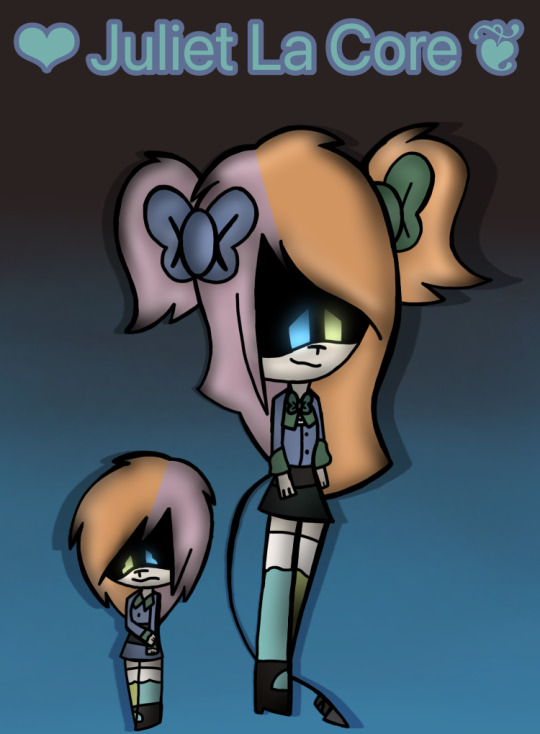

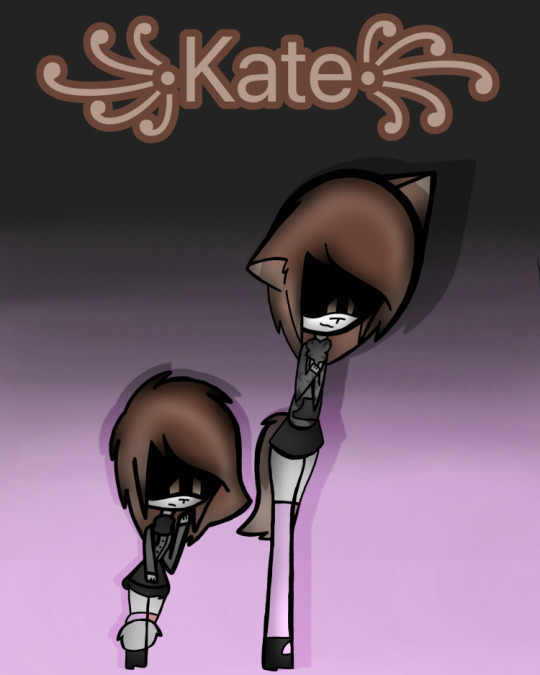
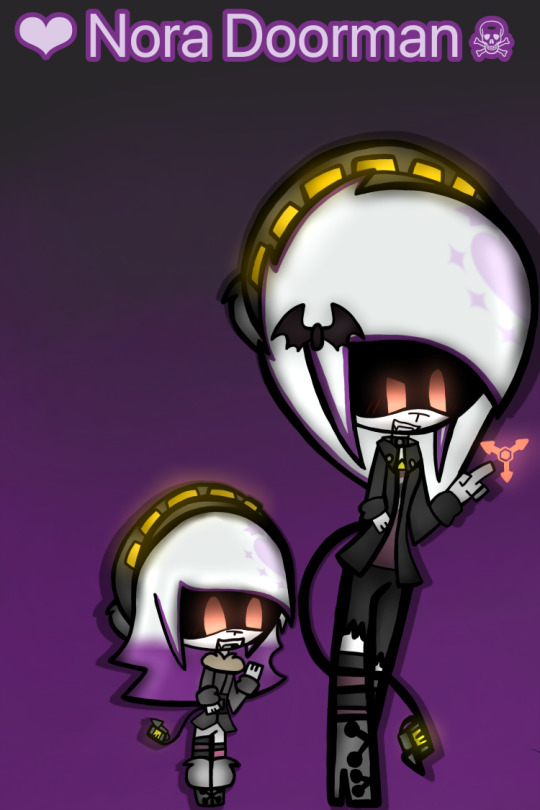
Whoops! My bad lmao
#murder drones#murder drones oc#murder drones kate#murder drones lucy#murder drones juliet#murder drones nora#md#md oc#md kate#md lucy#md juliet#md nora#nora doorman#juliet la core#lucy doorman#digital art#ibispaintx#kekeartz
12 notes
·
View notes
Text
Meet The Crew
So, here are all of my Murder Drone OCs for this blog
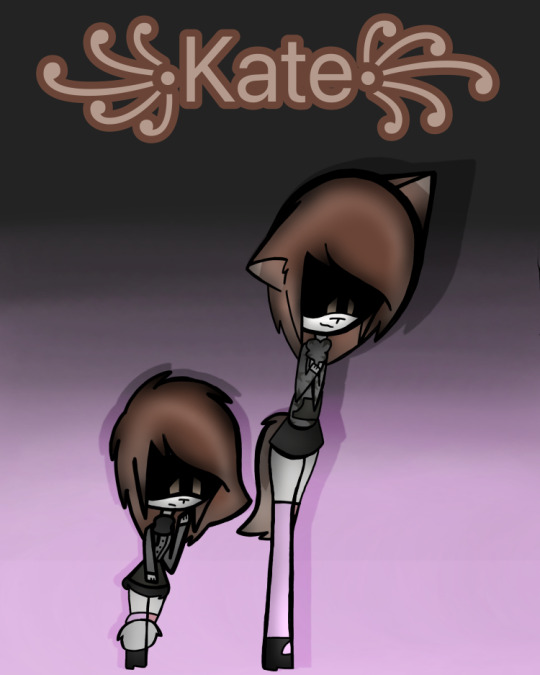
Kate: You may ask her about her adoptive siblings or maybe you could get to know more about her past
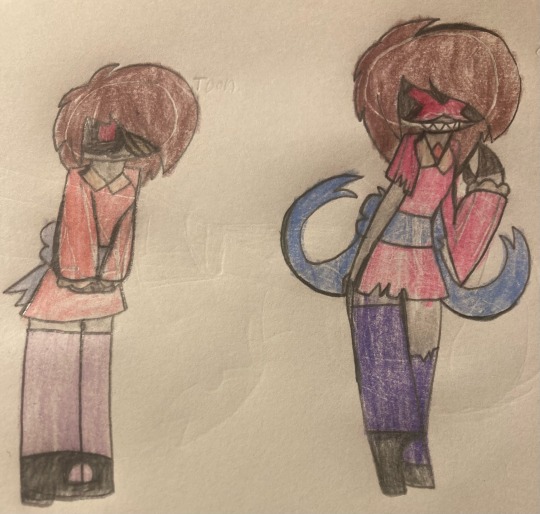
Cyra: You may ask her questions about solver drones or any questions relating to her adoptive family
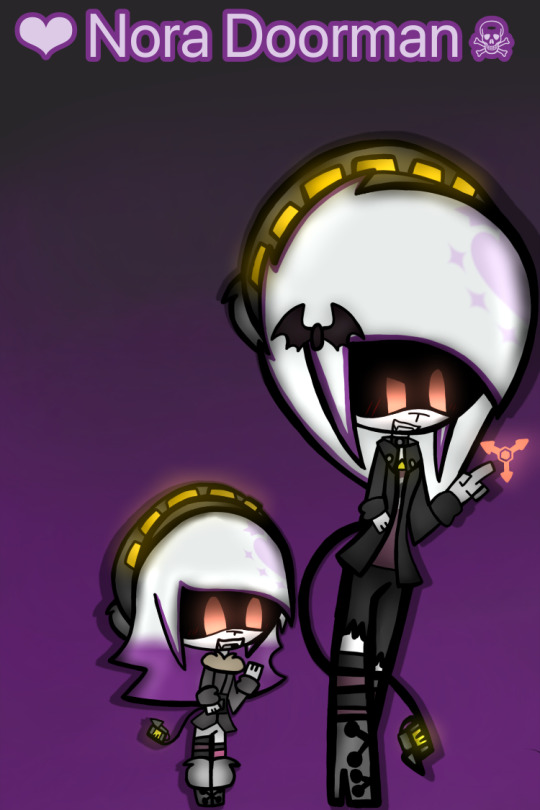
Nora: You may ask her Nuzi/Biscuitbites related questions or questions relating to her friends
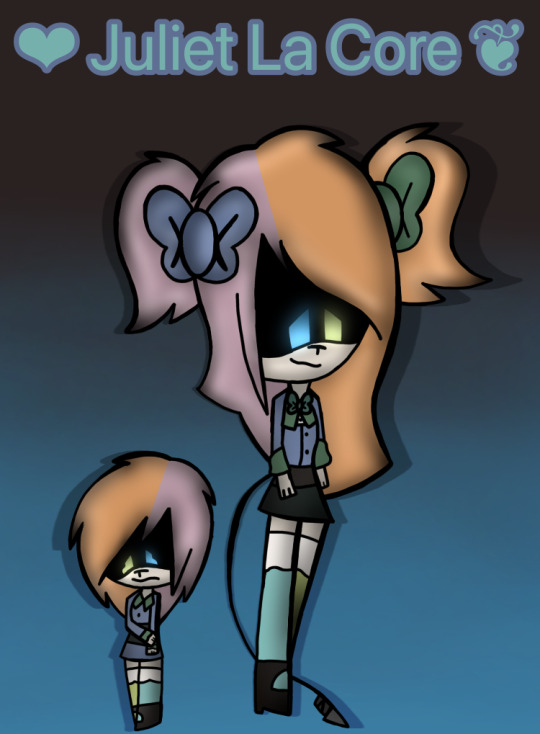
Juliet: Pretty much the same as Nora but Oilrose
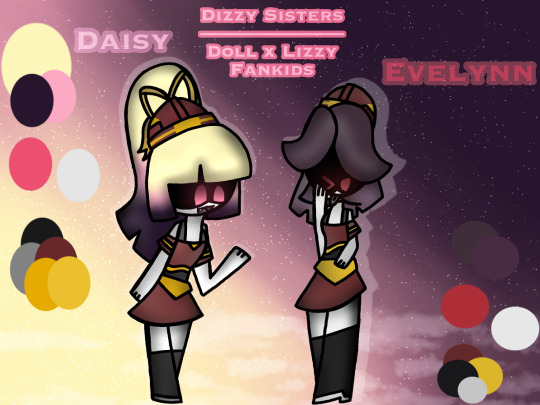
Evelynn and Daisy: Same as Nora and Julie but Doll x Lizzy/Dizzy

Serial Designation K: You may ask her things about disassembly drones or perhaps some things about her past when she used to be a maid at the mansion
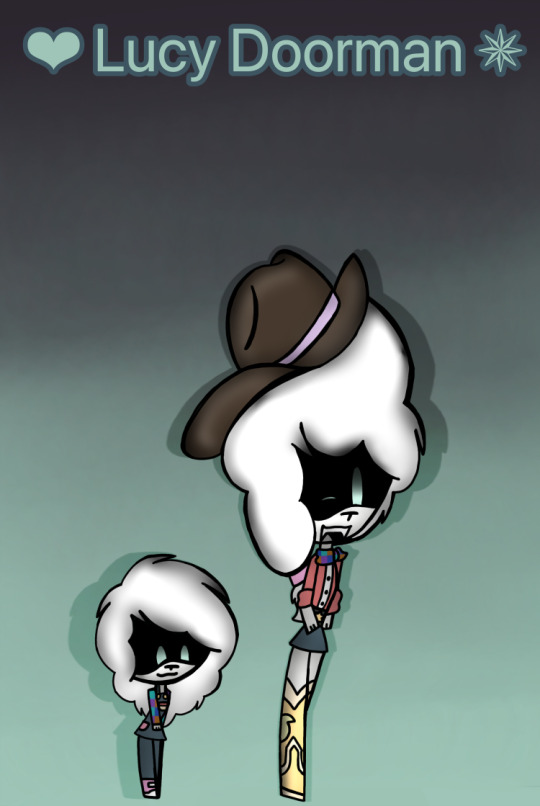
Lucy: You may ask her any questions that her other friends cannot answer
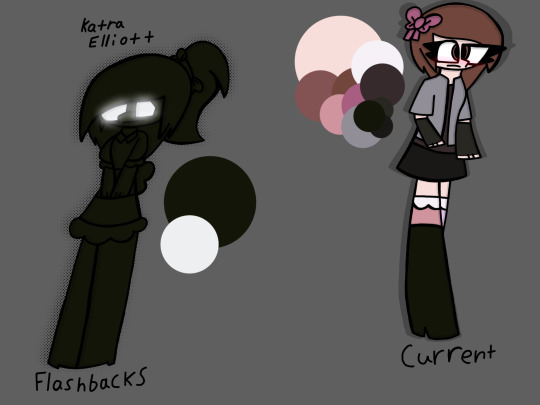
Katra Louisa Elliott: The only human in the cast, you may ask her about her past In Elliott manor with K and how they both ended up on Cooper 9 after escaping the manor when Cyn massacred the gala in episode five
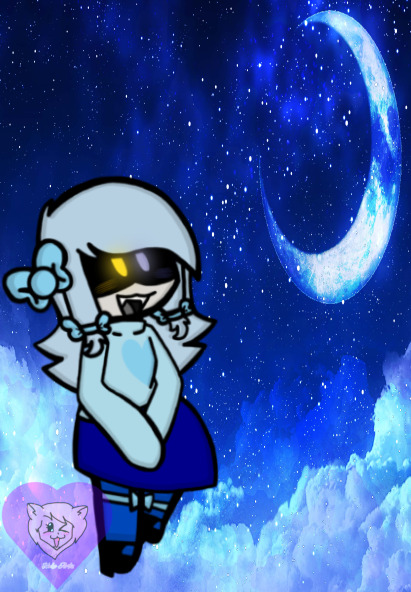
Cyanna: You may ask her things about her “mother” Cyn and her creation
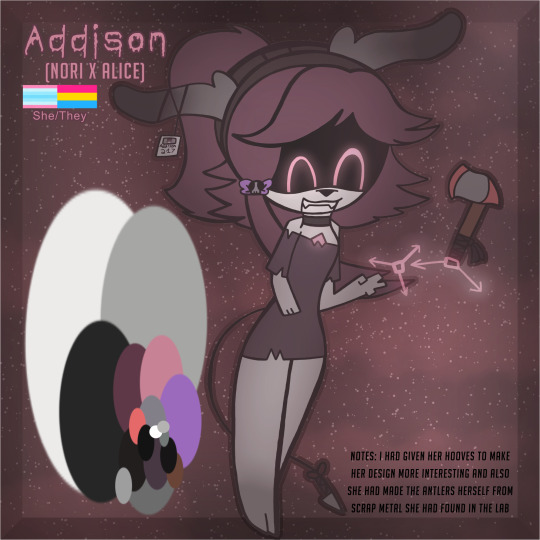
Addison: Ditto of Nora, Juliet, Evelynn, and Daisy but obviously Purplemalice/Nori x Alice
———————————————————————
How It Works
The ask pretty much come in the form of a call to the characters and they answer your calls (major inspiration from @tadcccallmyocs ran by @know-it-all-and-all)
I may draw their responses whenever I can make the time for it
#murder drones#murder drones oc#murder drones kate#murder drones cyra#nora doorman#juliet la core#lucy doorman#murder drones evelynn#murder drones daisy#serial designation k#katra louisa elliott#murder drones cyanna#murder drones addison#md#md ocs#md kate#md cyra#md nori#md juliet#md lucy#md k#md katra#md evelynn#md daisy#md cyanna#md addison#md oc call center#ask blog#asks open#kekeartz
12 notes
·
View notes
Note
Who’s most wanted ?
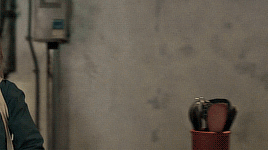
so glad you asked ! below the read more (it got prettyyyy long) is a list of the admin team's most wanted characters. members, feel free to reply with who you would love to see around here ! <3
lydia, jane, lizzie, and kitty bennet, fitzwilliam darcy, charles bingley (pride and prejudice)
johanna mason, annie cresta, haymitch abernathy (the hunger games)
stever rogers, natasha romanoff, bucky barnes, sam willson, pietro maximoff, matt murdock, luke cage, scott summers, jean grey, felicia hardy, reed richards, laura kinney, and kate bishop (marvel multiverse)
bilbo baggins, frodo baggins, samwise gamgee, aragorn, peregrin took, meriadoc brandybuck, thorin oakenshield (the tolkienverse)
percy jackson, annabeth chase, piper mcclean, jason grace, thalia grace, ethan nakamura, grover underwood, selena beauregard, rachel elizabeth dare, clarisse la rue, leo valdez, hazel levesque, frank zhang, reyna avila ramirez-arellano, carter and sadie kane, zia rashid (riordanverse)
sansa, arya, robb, and brandon stark, jon snow, gendry waters, davos seaworth, theon greyjoy, samwell tarly, margaery and loris tyrell, rhaenyra, daemon, aemond, helaena targaryen, laena, corlys, jacaerys, laenor valeryon, harwin strong (a song of ice and fire universe)
romeo montague, juliet capulet, mercutio, benvolio, paris, and rosaline (romeo and juliet)
the baudelaire orphans, the denoument triplets, the snickets, beatrice, esme squalor, and montgomery montgomery (a series of unfortunate events)
lorelai gilmore, rory gilmore, dean forrester, jess mariano, luke danes, paris geller, logan huntzberger, and lane kim (gilmore girls)
the core four (sam, tara, chad, and mindy), sidney prescott, gale weathers, randy meeks, dewey riley, kirby reed, and jill roberts (scream franchise)
zion miller, georgia miller, ginny miller, marcus baker, maxine baker, and abby littman (ginny and georgia)
sienna shaw (terrifier 2)
sally hardesty and vanita "stretch" brock (texas chainsaw franchise)
clear rivers, alex browning, wendy christensen, the ashleys, and erin ulmer (final destination franchise)
pete "the plug" conlan, ricky matsui, misty moore, kingston brown, adaine abernant, gorgug thistlespring, fabian seacaster, ragh barkrock, riz gukgak, delloso de la rue, ayda aguefort, the lords of the wing, evan kelmp, whitney jammer, sam butler, xXBrokenDreamXx, cody walsh, jet rocks, ruby rocks, amethar rocks, and theobald gumbar (dimension 20)
chris redfield, claire redfield, jill valentine, leon s kennedy, jake muller, sherry birkin, carlos oliveira, and ashley graham (resident evil)
7 notes
·
View notes
Text
Aittala Offer Powerful Pandemic Post-Mortem on ‘Live to Regret’
~Doomed & Stoned Debuts~
By Billy Goate

With so much of our shared media being safe and sanitized, it seems that music may be one of the few remaining bastions of honest and free expression -- a kind of litmus test of the human condition. Certainly Raleigh, North Carolina band AITTALA bears both heart and soul on the band's sixth full-length record, 'Live To Regret' (2022).
Written and recorded in the backdrop of COVID-19, Aittala commiserates with the heavy toll this whole miserable mess has taken on our relationships. The 11-track LP mingles elements of doom, sludge, groove, and thrash in seamless fashion for what amounts to a powerful pandemic confessional.
Beginning in down 'n' dirty swing mode, the title track is delivered with all the metal fixings, transforming the track into a groovy vehicle for the band's powers. I have a hunch you'll be humming this one on your way home from work this week.
"Collateral Damage" follows and shifts us to an overcast mood full of dissonant sounds and a dreamlike chorus. I'm sure many will readily identify with its words:
They’re always on your heels
So keep looking over your shoulder
You have to watch your back
And try not to lose your composure
"Saint" is a bonafide doomer, leaning more towards the Warning side of the genre, and features some gorgeous guitar harmonies. As I was listening to the lyrical narrative, it struck me how every anguished note was played with absolute conviction.
"Cannibals" is a classic thrash attack with crunchy chugging guitars and squealing guitar action, while "Big Brother" is as mournfully doomy as it comes. Even with the most winteresque numbers, Aittala has a knack for surprising us, here with a groove metal B-section. The lyrical sentiment is imbued with the stubborn independence of bygone generations:
We fall to our knees and pray
As we prepare for judgment day
We worship the collective fraud
Big brother is now our god
Another highlight is "Juliet (2022)," closing the record with the tale of a demented Romeo and Juliet couple. There are overtones of horror, both through the hypnotic pacing of the song and the tension produced by harrowing guitar chords and a pulsating synthesizer.
Live to Regret by Aittala drops on Monday c/o Exitus Stratagem Records pre-order. Stick it on a playlist with Apostle of Solitude, Crowbar, Famyne, and Paradise Lost, with a dash of Slayer for good measure.
This is the Doomed & Stoned world premiere.
Give ear...
Live to Regret by Aittala
SOME BUZZ
Aittala (pronounced 'EYE-tah-la') has been around since 1991 and in that time has developed a sound that is unique, progressive, and memorable. With a solid core of doom metal, they add hints of power metal, sludge and traditional metal, a feast of variety that is on full display in their upcoming seventh album 'Live to Regret' (2022). Lyrically, the album chronicles a chaotic period of time for members of the band personally as well as the global events happening in parallel.

The band comments on the album:
“Aittala is extremely excited for the fans to hear the new album 'Live to Regret.' The pandemic was a stressful time for everyone, but it’s even much more stressful when you’re dealing with an unhealthy relationship that’s full of tension and animosity on a daily basis. A lot of toxic energy fueled the writing of the album and became something of a way to cleanse the spirit of the toxicity.
"We hope the fans hear the pain, pleasure, and passion that went into the writing of these songs. I think they’ll connect with these songs more than prior albums because they are more personal. Overall, we’re very pleased how the album turned out. It’s definitely the best Aittala album yet and we look forward to building on it in the future!”
The album has eleven tracks, each defying the limits of genre rules. There is the trash inspired track “Cannibals” that confronts the tightening grip of governmental monitoring and control. The sludgey “Big Brother” about the devolution/zombification of the human race due to technology. The smoky stoner infused “Never Forget” that talks about dealing with a toxic person along with many more.
'Live to Regret' will be available on November 7, 2022, via Exitus Stratagem Records and was produced by Eric Aittala and John E. Wooten IV, who also mixed the record along with mastering by Dave Harris at Studio B Mastering. Album artwork by Mariano Pugliese.
Follow The Band
Get Their Music
#D&S Debuts#Aittala#Raleigh#North Carolina#doom metal#thrash#sludge#groove metal#heavy metal#Exitus Stratagem Records#D&S Reviews#Doomed and Stoned
0 notes
Text
anyone wanna be annoying nit pick my spelling/grammar in a tnt duo fanfic?:
Chapter one, wilbur:
Wilbur sat in the tallest spire of the royal library. Draped over the dark oak sitting chair. He wasn’t trapped here by any means but to an outside observer is may have loved that way, whith him never leaving the building unless it was for a biweekly family dinner, and having untakesfull food brought to him on request of his twin brother, the only person who really seemed to care about his well-being.
Really the reson the price spent every waking hour in his tower was because all his favourite book where here. Though he’d never admit it, he enjoyed the cheesy romances where everyone died at the end the best.
“WILBUR WILBUR WILBUR” his younger brothers voice echoed though the tower
“Yes Tommy” Wilbur quickly swapped the book he’d been reading, as you like it, and pulled out red leather bound book that looked sootabull.
“Will, why are you reading Romeo and Juliet?” Oh
“Research” he said.
“Well, dad. Sorry sorry, his royal highnesss king Philza, whats to see you for something” he look around and then back and wilbur “I think he’s got a job for you” he wispers with giggle and the bookets it from the room.
Wilbur stands, straightens his hair and sets out to find his father.
“Will” his father greats him
“Yes your highness”
wilburs relationship with his father had been tense ever since it was claer he wasn’t going to be like the great kings of old. There where still good moments, the two would read together in silce after Tommy has gone to bead and Techno had gone wherever he goes with mother every night. So it was just them, father and son. No words where needed then.
But those small moments of bliss where becoming more and more sparse as Phil became more distant. Though Wilbur locking himself in a tower probably didn’t help the matter.
“Wilbur you are to become king when I step down” step down. Because Phil wouldn’t die. He would just decide Wilburs life was going well and then he’s step down.
“I am aware father, is that the only reson you asked me here?” Obviously it wasn’t but Wilbur wanted to leave, get back to reading. He’s been making his was though all of Shakespeares works and was thury enjoying As You Like It
“I want you to represent me at a conference in las navadas. My scetaul is full that week and it will be good practice for you”
Wilbur has heard of las navadas. A ration run by a teen progy. A boy young them him, though only by a year, named Quackity.
The roomers tell of him being a cruel and ruthless. Raised by former dictator Jshlatt.
“Of cores I can go” despite himself, Wilbur was curoirus about Quackity and Las Navadas. He wanted to meet the man behind the throne.
Phil sat, looking at the spot where his oldest son stood
“Isn’t this too much responsibility to leave in the hands of such a young child?” The shadows cast by Phil’s throne parted to reveal a pale woman, her hair and dress seemed to be the shadows. She wore a glove that seemed to melt into her dress on one hand and on the other a simple ring to match Phil’s.
“You think everyone is young to you” Phil told his wife
“I see war on the horis, the shadows whisper to me about a new power” she told him. His throne draped in shadow as she moved around it.
“I know, but I think he’s ready for this”
“I just don’t want him to get into the middle of something he doesn’t understand. 16 is a bit young to lead a kingdom”
It wasn’t that Wilbur didn’t enjoy getting all dressed up and talking, quite the contrary actaully, he just hated packing all those nice cloths away.
The conference was 3 days long. 3 lavish but not boastful outfits, a waist if dimdons if you asked him. Not even mentioning the ball on the last night. It was supposedly to help everyone wind down after 3 days of non stop debates, but from Wilbur’s experience, balls where just meetings in glitter.
he just had to spend most of his time sitting and listening to what Quackity had to say. Every now and then he would chime in with something his father would say, then back to “sitting still and looking pretty”.
The carage was white, embellished with emeralds.
Wilbur stepped out on onto sandly ground, of all the taver whispers and roomers he’d heard, non has though to mention the vast plains of sand. Or the sand that was now lodged in his boot.
Wilbur was dress in a frilled white under shirt peeking out from beneath and yellow jumper and a dark brown capelet on top. bowrn knee high boots hidden under black dress pants.
How the sand got in his boot sin the first place was beyond wilbur.
Head up he walked into Las navadas
7 notes
·
View notes
Text
AF characters by how good or bad they’d be as a college roommate
Artemis: How and why did your university allow a child to enroll? While Artemis is, at his core, a criminal mastermind, he is still caught up enough in the neurotic social mores of the haute monde that he’ll never get explicitly confrontational with you, for better or worse. However, I cannot stress this enough: if you don’t abide by the specific rules for how he wants the aesthetic arrangement of the room to be, he will move your things for you, and then deny having done so. Good luck ever having anyone over at all, because he will forget every last manner he’s ever learned to try to subtly make clear the fact that strangers are not welcome in this sacrèd dorm space. On the plus side, if something breaks/you guys need to spruce up the place, he’ll foot the bill. 3/10.
Butler: he gets home late and wakes up early. To be frank, you’re not even sure he exists sometimes. His side of the room is fairly spartan, and you’ve the sneaking suspicion he’s a plant from the university to 21-jumpstreet you all. One day, he has friends over, and you never emotionally recover from seeing him get ribbed over having drunkenly recited a passage from an Agatha Christie novel whilst drunk at the kegger he’d agreed to be the designated driver for. He’s scary, but easy to live with — that is, aside from the baggage he brings to the table in the form of the 15 year old business-major with whom he somehow developed a lord/vassal dynamic a week after orientation. 5/10
Holly: Is she pre-law? Pre-med? Who knows, but she sure as all hell has enough scattered coursework around the dorm for seemingly unrelated degrees. She’ll get somewhat up in your business if she senses you’re not taking care of yourself, but you know for a fact that one of her friends photocopied her student ID to give the campus cafe so as to prevent her from going to a caffeine-induced early grave. She’s also the kind of roommate who is the designated Squad Host, and it feels like you’re rooming with 5+ people instead of just her. However, she’s not messy, and she’ll help you out when you need it. 6.5/10
Juliet: She is somehow the most stressful person you’ll ever meet. If she weren’t so nice, you’d suspect she was heading a protection racket. She’s the personality of a labrador retriever puppy in the body of an olympic strong woman, which means she’s accidentally broken the door handle when trying to get back into the room once or twice. She loves glitter, and as anyone who knows the most basic information about said substance is aware, that means your dorm room is shinier than the swarovski crystal bedecked trees out in Las Vegas. She does not apologize for this, and she will never apologize for this. 4.5/10.
Foaly: Frankly, you were surprised to learn that he doesn’t have a Reddit account. Though well-meaning, he is extremely susceptible to conspiracy theories, and he’s been banned from the University Facebook group more than once for trying to get the astrophysics department to “admit” Neil Armstrong is a fraud. He’ll do your math homework for you if you pick up his favorite produce at the local farmer’s market though, which is kind of helpful. 3/10.
Mulch: Extremely messy. Keeps really weird hours. However, won’t narc you out to the RA for Shenanigans™ should you indulge in some dodgy extracurricular activities. Will rile up the business majors by passionately arguing for a return to the barter system, which is always a good source of entertainment. 6/10.
139 notes
·
View notes
Text

˚ ⊹ · . ⌜ main. go minsi. cis female. she + her. ⌟ huh ? oh ― that’s just victoria park. as far as i know, they’re twenty-four years old and last i heard they’re a beauty influencer / aspiring ballerina. they’ve been in hope for eight years and around here, they’re known as the amaranth, but everybody knows all that. what you really ought to know is that they’re kind of choleric, and self-centered, but persistent, and vociferous at the same time. and if you ever need a favour from them, get them a pair of pointe shoes. that’ll do the trick. leos, am i right ?
i. statistics
❀ ━━ general
full name: victoria park
age & d.o.b: twenty-four & august 17th, 1997
gender & pronouns: cis female & she + her
orientation: demiromantic + bisexual
nationality: american
ethnicity: korean
place of birth: los angeles, california
current residence: hope, alaska
education: high school diploma. university drop out
languages: english, french (conversational), & korean
occupation: beauty influencer / aspiring ballerina
❀ ━━ physical
facelcaim: go minsi
eye color: brown
hair color: brown
height: 5'2"
build: dancer physique, slim & lithe
piercings: two in each lobe
tattoos: none
❀ ━━ personality
positive: persistent, vociferous, alluring, meticulous, & fervent
negative: choleric, self-centered, manipulative, impatient, & pretentious
mbti: enfj-a / the protagonist
moral alignment: chaotic good
hobbies: retail therapy, museum hopping, spontaneous beach trips, golf, yoga, consuming ungodly amounts of iced coffee, & dance
likes: sweets (cakes, pastries, deserts -- anything made with sugar), luxury fashion & expensive cosmetics, fruity cocktails, & complicated, multi-step skincare routines
dislikes: breaking in new pointe shoes, ripped tights, cold weather (rip this poor la princess), spicy food, & disorganized closets
❀ ━━ family
mother: juliet park / presumed deceased estranged
father: nicolas park / living
siblings: elder twin brother / living [wc here !]
paternal grandmother: deceased
paternal grandfather: living / estranged
ii. backstory
tw: brief mentions of death
as the youngest and only daughter of the infamous nicolas park, victoria park never had to want for much as a child. she was far too young to remember a time before the glittering, silver spoon in her cheek, the days when her father had to work two jobs just to provide for their little family, or the evenings he spent grinding away at night school. even memories of her mother were few and far between. no, victoria’s earliest memories consisted of causing mayhem with her older ( by a millisecond ) brother on the estate grounds of their childhood home in los angeles and being lovingly doted on by her grandmother and father.
upon entering school, the stark differences between the park siblings began to manifest themselves. unlike her brother, who seemed to excel in his studies without having to crack open a book, victoria struggled academically ( who cared about calculus when there was twitter ? ), however, she was much more athletically inclined. bouncing back and forth between gymnastic meets, cheerleading tryouts, and dance recitals, victoria’s afternoons were either spent in the gym, on the sidelines, or in the studio. while the eldest preferred to keep to himself, victoria thrived on the attention of others and was quick to amass friends and popularity within her peers. by her junior year, it was almost a guarantee that victoria would-be prom queen and cheer captain her senior year. but the chance never came as tragedy struck.
when she was fifteen, victoria’s grandmother and the only real “mother-figure” in her life died. the sudden passing of such an integral part of their family shook the parks to their core. in wake of such a devastating loss, victoria was suddenly yanked from the only place she had ever known as her father decided they all needed a change from their fast-paced lives in los angeles, moving them all to the quaint, little town hope, alaska. while her brother was quick to adapt to the sudden move, victoria resisted, feeling betrayed at being forced to leave her life in la behind.
she couldn’t leave hope fast enough. after graduation, victoria wasted no time in fleeing the biting cold of alaska to the warm familiarity of los angeles for university. but victoria’s first real taste of freedom, short-lived and overshadowed by failure, came crashing around her when she flunked out of her program at ucla only half a semester into her sophomore year. once again dragged back to hope. though he never said as much, victoria could feel her father’s disappointment at her return, living in the shadows of her brother’s success in new york. but, she was anything if not tenacious. while academics had never been her forte, she turned to social media, networking and cultivating a platform online as a beauty influencer and gaining a fair bit of traction. in her spare time, victoria has picked up dancing again, entertaining the possibility of going professional.
unlike her father, who seems content with the quaint, small-town atmosphere of hope, victoria misses the spontaneity ( and warmth ) of los angeles. but she’s still licking the wounds of her latest failure and is in a state of limbo -- fearful of the future but not quite ready to let go of the past, trying to come to terms with the truth of her mother’s absence and live with her father’s deception.
#hope.intro#ahh i *hope* this makes sense#haha i think im funny#~~will be back to edit & add pretty graphic~~
8 notes
·
View notes
Text
🚨The Rise of Skywalker Detailed Review and Spoilers Ahead🚨

George Lucas: “If the boy and girl walk off into the sunset hand-in-hand in the last scene, it adds 10 million to the box office”
The “fairytale” we got: A long long time ago in a galaxy far far away, there was a curse of pain and death in a family that just went on and on. They were never able to break it and they all die, the end.
Well, you did it JJ, you little punk...you ruined 40 years of cinema. Kids are coming out of theatres crying, they can’t understand. I guess this was the “fun and hopeful ending” you were speaking of during the press tours. Are you on crack or something, or just sadistic....why would you promote it like that!? Did you forget Star Wars at its core is a story of hope, light, a fairytale in space for children? They did it...they united Reylo’s and Fanboys through hate.
JJ you do realize tragical romances are only tragically romantic if there was romantic buildup? Romeo and Juliet married in secret, Anidala did as well and flirted in the fields. How was this supposed to be satisfying? A five-second beginning, middle, and end. How this went through multiple execs is beyond me.... I would have understood if Reylo was Rian’s creation. BUT JJ LITERALLY was the one who told Rian to go forth with it...he created Reylo so you can’t say the last Jedi derailed things on that front. JJ wasn’t brave enough for his own vision. This movie was like “the crimes of Grindlewald”, a lot of stuff happening that made me feel nothing.
Okay, first things first. The OG trilogy was necessary, the prequels were necessary to set up that Vader did not start off bad. What was necessary about the sequels? They just dismantled everything the Skywalker family worked for. Why did we have to see ALL of our favorite characters die? Was the aim that a villain can only be redeemed through death? How original. I’m convinced what they were planning for since force awakens was a journey from villain to hero...but instead we got this a 10min redemption resulting in death a la Vader. Why call Adam Driver’s character a “Disney Prince”?When did Happy endings become so controversial? We go to the movies to feel hope, to escape reality...George Lucas understood that. JJ’s trilogy is uninspired, bland and contributes nothing to the saga. JJ went as far as to recon his own “The Force Awakens”.It had the chance to define generations but no. Literal and utter garbage. Rian made some odd choices but he was bold, unafraid and had the vision. HE knew emotion was at the heart of Star Wars.
WHERE DID THE SKYWALKERS RISE? MORE LIKE RISE OF PALPATINE, HE BLOODY WON
BUT my problem is not with the ending, it’s the bloody entire movie. This movie made me realize that it's not Reylo that I am a fan of, it was Ben, Leia, Han, Ani, Padme, and all those other characters. I’m upset because this movie is not my Star Wars: of family, love and above all else hope. This is just a 2.5-hour video game with no emotions. This trilogy was all angst with NO payoff.
Okay, you will never ever convince me Palpatine was planned the whole time. This whole movie was retcon for the Last Jedi that pissed off the fanboys. Lucas films did not have an outline for the three films and Rian derailed whatever they wanted to do....except they didn’t even tell him what they wanted! This should be a cautionary tale of why you need to plan. Kylo ain’t bad, Snoke is gone....well pull out Palpatine I guess. This whole film is JJ’s mad scrambling. Alright, I will humor you, tell me how Palpatine came back when he fell down a shaft and exploded....not *boom boom because of force*. The force in this movie is not canon George Lucas force, it’s just an easy out whenever JJ wants one.
1. Opening Crawl: As soon as I saw this I knew all the leaks were true, I wanted to bolt from the theatre. When I saw them in August I laughed cause it was so ridiculous it couldn’t be true. How could Disney let a whole movie leak? The plot seemed like a bad fan-fiction. Actually, fanfics are way more true to lore. Anyway, so Palpatine “announces” that he’s back. Is this the shrewd Chancellor Palpatine we know? Certainly, not...why in the world would he announce it rather than keep on the DL and just attack. Yo Palps ain’t this dumb why would you let them (the resistance) prepare?? Because of plot...well okay.
2. Did Last Jedi even happen: this film is the sequel to the force awakens, like TLJ never happened...except it’s acting like there was some movie in between that JJ made. Okay, so why is Kylo trying to run Rey over with his tie fighter...he doesn’t really want to kill her. It’s just meaningless action shots. And don’t get me started on exposition, the dialogue: “hey look its the Knights of Ren”. Except they do nothing. Cool cool. Kylo’s character goes back to Force awakens era like no development had occurred...except he’s not even there he’s just messing around not even being a real villain. JJ’s specialty is set-up and he does this beautifully....but he can not wrap up and follow through.
3. Rose Tico: yup last Jedi never happened, she has nothing to do. She and Finn are irrelevant. Finn has reverted to being obsessed with Rey. Cool Cool. I honestly feel so bad for the lovely Kelly Marie Tran. How did you relegate a relatively big character into the sidelines?? Why introduce two new characters this late. Rose could have filmed in for them...but alas we must snub Rian at every turn because that’s just how petty JJ Abrams is. ( don’t get me wrong Jannah was cool)
4. The Rise Of Poe Dameron: Finn has been relegated to a side character who does nothing and just yells “REY!”. It was a great setup, a stormtrooper who was force sensitive but doesn’t want his life to be fighting for nothing. You could have explored trauma, the discovery of the light but nope nada. Tell me the point of his character journey. So flat and static. And with Jannah and the ex stormtroopers they could have gone with the arc of these lost, sad kids coming together to find family.
5. Leia: Okay you’re telling me our Princess would give up on her son before he was born, just throw away her lightsaber and accept Ben’s fate? Cool alright. And she knew about Rey Palpatine and didn’t say anything...my princess would never.
6. Mary Sue Rey: Ahh Rey this girl feels no emotion in this movie...just like the audience. Sure she’s trained but she can just do stuff with the “force” that even Jedi masters can’t. Stopping a whole starship, something even Yoda could barely do...yup she can do it. Beat Kylo all the time except one, yup she can. Manipulate the force in mind-boggling ways, heal people...sure Luke couldn’t but Rey certainly can. Cause she is the chosen one...hell even Ani wasn’t this talented and he had years of training. Poe and Finn have a genuine connection, Rey just seems disjointed (totally understandable why)...but if so the ending is even worse. She doesn’t even find peace with her friends. She’s not realistic and human like Luke and Leia were.
Force sensitivity in the galaxy: What a perfect setup, the boy with the broom at the end of TLJ that was force sensitive. The message is that the power to use the force was spreading through the galaxy. No longer confined to the elite. People were hearing of Luke’s battle of Crate and rising.
7. Kylo/Ben: I still maintain that he, other than Ani was the most nuanced character in the whole saga. His arc from Force Awakens to Last Jedi had progressed. How great that even someone from the legendary line of skywalker and solo could fall to the dark again. He wasn’t flat, he was a tortured boy that was conflicted since the first movie. How great would it have been to see him as a conflicted supreme leader, which was set up in TLJ. But *gasps* a plot of his very own, no can do, this is the nature of JJ’s crush on Rey and Daisy.
Disney released comics that made us sympathize with him, to see that all along he was manipulated by Snoke, and Palpatine the voices in his head. Neglected by those who were supposed to love him. Adam Driver was cast perfectly, he had almost no lines that weren’t related to Rey’s charcater arc. If he were a woman I’m sure everyone would be offended. That single line’s delivery “Dad-”
Come on Poe had more lines than him, and Driver according to JJ was half of the protagonist. He was pitched an arc opposite that of Darth Vader that’s why he signed. Man JJ really did do everyone dirty.
8. Ben had no lines while redeemed other than “ow”...I am so sorry ADAM that this nasty ass JJ did this to you...this part was 100% improv by Adam, I am willing to bet my life on it. You know why “ow” was brilliant? Cause it meant he felt pain and emotion, he was no longer hiding behind the hardness of Kylo REN. Adam’s performance as Ben left me speechless, he was convincing as Kylo, intimidating...but as BEN he shines in the way only Solo’s can. The way his eyes become determined once he accepts he must give his life, and he does so happily for the love of his life. His soulmate. Star Wars and JJ never deserved the talent that is Adam Driver.
9. They are supposed to be equals in the force yet they missed the opportunity to fight Snoke together. Tell me how they are equals. He existed only to further Rey’s plotline.
Oh and the other Jedi including Anakin whisper and help Rey...when his own grandson has been asking for help in distress for like 30years. Nice real nice.
10. Finally Reylo: it felt unearned cause there was no buildup, JJ just threw it in for kicks forgetting all the P&P parallels he was shooting for. An afterthought. Driver and Ridley’s acting saved the day, they had no lines. Adam Driver is truly one of the finest actors. You could see the difference between Ben and Kylo in his subtle gestures...the sass was pure Han Solo.
11. And then the death: I wouldn’t even say we won, but at what cost. We won in no way. Had he died fighting I would have understood, but this death was so unnecessary and put in just for the fanboys. Let me say again I would have been okay with death had it been justified. How is this any different than Vader x Luke. JJ can only copy not create. How crazy that you can just bring people back from the dead...Anakin is here like, am I joke to you? I could have brought Padme back say what???? What was the point of his whole fall to the dark. The force is infinite, that’s the whole point...once you know how to use it you can’t run out of it like juice. Oh, and Ben did not become one with Rey but rather the Force according to the Disney website. So why pray tell did he not appear as a force ghost? I’m convinced JJ was on crack.
12. No Mourning BEN no acknowledgment: 5 seconds! And then she moves on from losing her soulmate, half of her soul. She loses it over Chewie but nothing, no emotion not even a second over her other half. Seriously? No one ever knows Ben came back...nada. JJ set up Reylo, time and time again he has said that he crafted the story around the romance. He was left scrambling after Last Jedi and this was a last-ditch shock ending. No Reylo theme song, no across the stars
13. Last Jedi told us you don’t have to come from a powerful family to be important. THE WHOLE thing was that you could be force-sensitive and be a nobody. Nobodies can become somebody. A Hero is not born but made. The force lives in all beings, not just powerful families. It inspired me, what a great message to young guys and gals. Kylo’s line, “you come from nothing, you are nothing...you have no place in this story” finally turns out true. You have to come from something to have a part in the Star Wars story. And Rey had darkness inside her cause she was human. Because none of us are pure, we are shades of grey. But no, it’s cause darkness only runs in families. In the Last Jedi when she wants to see her family all she sees is herself and a shadow (Ben) who joins with her. Please do explain this JJ. And if this granddaughter thing was set up I would have had no problem...but they pulled it from their asses. You can have nothing but mean something. But no pander to the fanboys. In the end, a Palpatine lived and all the skywalkers ended....and we are supposed to have hope. Palpatine really did win.
14. Rey’s biggest fear was ending up in the desert alone, we were told “the belonging she seeks is ahead not behind” and “there’s someone who could still come back”. They mentioned she felt just as alone with the resistance. Only the other half of her soul understood her. This is truly tragic and sad...I am so heartbroken for her. And don’t tell me she isn’t there to stay...the soundtrack is called “a new home”. Enjoy the rest of your days being exactly where you started Rey....but hey at least you got a droid boo. I’m convinced this is not the balance JJ envisioned in the first movie. At one point in TFA Rey looks up sees an old woman alone, scavenging in the desert. This rattles her to the core and it starts her journey of wanting a better, different life. I am so sorry Rey. Okay so you may say she has the resistance and her friends...but let’s consult the last Jedi. In the end when everyone is on the ship...Rey is surrounded by friends yet looks more alone than ever. No one but Ben, maybe Luke, Leia, and Han understood her pull to the dark.
How sad that these two hopeless souls who had never known a moment of belonging and true love, found it for all but a few seconds.
I will quote: “preventing female characters with strong, compelling narratives from experiencing love, intimacy, and affection is just as regressive as reducing them down to sexual accessories. Assumes that women must choose between a romantic interest and depth of character”
Men really can not write good female characters, can they? A woman really can’t be a badass and end up with the love of her life
15. The Skywalker’s and Redemption: How truly truly sad that Han and Leia gave their life for their son who also died at a young age. ALL the Skywalkers and Solo’s have a tragic end. This is not what George Lucas wanted. What a tragic way to end this saga...they weren't able to break the curse. AND to all those troubled kids out there that lashed out and made terrible mistakes in their youth....doesn’t matter what you do dying is the only way out. You could have exiled him, made him pay in other ways. Nothing can be done to make up for your sins but death, no amount of good means that you can come home. To the young boys that get wrapped up in terror organizations, sorry the only way you can be redeemed is death...don’t bother changing and coming back. They could have exiled him, had him start an academy with Rey for Jedi kids. He could have spent the rest of his days redeeming himself. Why tell us he was literally preyed upon, haunted, and manipulated as a child. Even in a fantasy world, a victim of mental illness and abuse can not catch a break. Ben as a child could not fall asleep due to the demon-like voices in his mind. Everyone abandoned him in his time of need. Ben never desired power like Anakin, he went over to the dark because “the voice” of his grandfather promised belonging. I am shocked that this is the message Disney sends us. Oh and yeah you can totally take on the Skywalker name for kicks...the disrespect I swear
16. The worst bit is that I am 90% sure there was another ending that was scrapped. There was a promo shot of Jannah in a field, soft lighting, lush planet. It was exactly like P&P. Daisy Ridley said the lasts scene was known to only Her, Jannah on that panel (Driver was away). Convinced Jannah was looking at Rey and Ben starting a new life away from the desert which she and Luke hate so much. Hence the production of “A New Home” soundtrack. Hence why the “Farewell” song played behind Reylo kiss was hopeful. Why Luke’s soundtrack when he became part of the force was not triumphant. Why the death scene was sudden and cut weird and no sorrow from Rey. CAUSE THEY SCRAPPED THE ORIGINAL ENDING LAST MINUTE. Everyone knows JJ was still editing one month before. The concept art which was supposed to be released this month has been pushed to March. Why you ask? They need to remove the pages with a happy ending. He just didn’t have the guts, pandered to everyone and yet no one. He was successful in creating a beautifully filmed action-filled movie with none of the heart of Star Wars.
And then she goes and buries Anakin’s saber on freaking TATOOINE. He HATES Sand and Luke wanted to get away from there as soon as possible. Of course, a Palpatine would torture them that way. But nostalgia is the cash cow so. JJ can only generate nostalgia, not create original stories. IF he had any creativity she would have buried it at Padme’s grave.

The fanboys say “leave the romance for the romance movies”....have you seen the original trilogy or the prequels? Star Wars has always had hope and romance entwined with it.
SO AFTER 40 YEARS...PALPATINE WINS...HIS BLOODLINE LIVES ON
...and people thought the prequels were bad
JJ you also said that your goal was for people to come out of the movie feeling more hopeful and happy then they went in...yet here I am. My roommate literally had to console me and buy me ice cream. I am just so numb. I am sure the casual fan will enjoy this, as seen from the rotten tomatoes ratings. I think the critics were too generous with this one,
Star Wars is very simple at its core, Good vs Bad and Dark vs Light. The kids are expected to understand that a Palpatine being the only one who lives is hopeful? That is the conclusion of three generations of Skywalker sacrifice...
This is how the Skywalkers are remembered...In Tragedy and Curse??
#the rise of skywalker#ben solo#reylo#ben solo deserved better#jj abrams#star wars#george lucas#a new home#adam driver#daisy ridley#rise of skywalker#luke skywalker#skywalker saga#kylo ren#kathleen kennedy#rian johnson#the last jedi#reylo fam#tros spoilers#tros
3K notes
·
View notes
Text
24/7 Dance Convention, Reno, NV: RESULTS
High Scores by Age:
Sidekick Solo
1st: Lauralee King-’Bigger Is Better’
2nd: Valentina Segrest-’All Is Found’
3rd: Nyla McCarthy-’Wind It Up’
4th: Nicole Soto-’Shake and Shimmy’
5th: Brecca Garcia-’Day-O’
5th: Kenlee Townsend-’Kill The Lights’
6th: Ayla Zink-’Stop’
7th: Wren Lavery-’Sweet, Sweet’
8th: Paisley Greendandl-’Worldwide Party’
9th: Marley Cliffe-’Dessert’
9th: Greta Jones-’Shake Rattle and Roll’
10th: Malia Tuaileva-’Stupid Cupid’
Mini Solo
1st: Roxie Onellion-’Drifting Down’
2nd: Isabella Kouznetsova-’Almost There’
2nd: Tiara Sherman-’And The Things Remain’
3rd: Harper Ducale-’Change Is Everything’
3rd: Winter Eberts-’Dreamlike’
3rd: Naiya Abalos-’Forces’
3rd: Cali Cassidy-’Weird People’
4th: Paizley Cogswell-’A Moment Apart’
4th: Fiona Wu-’Juliet’s Dream’
4th: Joah Moore-’Mad World’
4th: Regan Gerena-’My Boyfriend’s Back’
4th: Presley Nava-’Pure Imagination’
4th: Delilah Hewitt-’Shop Around’
5th: Peyton Nowacki-’Angels To Fly’
5th: Kylie Lawrence-’Breathe In’
5th: Tatum Brady-’Fall Creek’
5th: Everleigh Soutas-’Heartbeat’
5th: Olivia Armstrong-’Hit Me With A Hot Note’
5th: Kate Baker-’I’ll Stand By You’
5th: Aria Du-’Reddir’
5th: Elizabeth Hsu-Kwan-’Ruin’
6th: Diana Jouznetsova-’It’s In His Kiss’
6th: Hadlee Heriford-’Unbroken’
7th: Tabitha Nan-’Torn’
7th: June Newmarker-’What A Feeling’
8th: Zoey German-’On My Own’
8th: Elliana Anbardan-’Runway Walk’
8th: Joy Lin-’This Is Me’
9th: Rory Frye-’Amen’
9th: Aurora Brady-’Hit The Road Jack’
9th: Reagan Nordling-’Lemon of Pink’
10th: Khloe Kwon-’Black Pink!’
10th: Aubrey Tolentino-’Footwurkin’
10th: Holland Fraley-’Torn’
Junior Solo
1st: Gracyn French-’CoverGirl’
2nd: Laci Stoico-’Mibiso’
3rd: Makaia Roux-’Everything I Wanted’
4th: Mya Tuaileva-’Can’t Unhear’
4th: Kortlynn Rosenbaugh-’Unearthed’
5th: Hayden Olson-’Breathe’
5th: Lincoln Blakely-’What I Came to Do’
5th: Kendyl Fay-’You’ll Find A Way’
5th: Madison Ortega-’Island Song
6th: Campbell Clark-’I’ll Be Seeing You’
6th: Kylee Ngo-’Ex machina’
6th: Ciana Ciulla-’Sophrosyne’
6th: Madison Ronquillo-’White Ferrari’
6th: Rylee Young-’Lullaby’
7th: Bella Fernandez-’She Was Running’
7th: Kendall Jundt-’Awakening’
7th: Leighton Werner-’The Rose’
8th: Gigi Hipwell-’Sorry Seems To Be The Hardest Word’
8th: Abbi Francis-’Feel It Still’
8th: Sienna Brown-’Ballroom Blitz’
8th: Natalie Kulba-’Ascending’
8th: Stella Eberts-’Valley’
8th: Campbell Bas-’Silhouette’
9th: Anabel Alexander-’Plans We Made’
9th: Lena Chiem-’Grand Piano’
9th: Anya Inger-’Quiet Thoughts’
10th: Sunnie Pelant-’No Place Like Home’
Teen Solo
1st: Dyllan Blackburn-’Haunted’
2nd: Kaitlyn Tom-’Charity Bound’
2nd: Luke Barrett-’Eden’
2nd: Carley Thinfen-’Self Destruction’
2nd: Elle O’Donnell-’Slowly’
2nd: Imogene Elias-’Timer’
3rd: Zoe Ridge-’A Thousand Eyes’
3rd: Katy McIlwaine-’Heavy’
3rd: Cydney Heard-’I’m Going In’
3rd: Ava DeCristofaro-’Letting In’
3rd: Isabella Warfield-’Nicest Thing’
3rd: Jenna Koblin-’Ultralight Beam’
4th: Kaitlyn Ortega-’All Human Beings’
4th: Sami Sonder-’Fever’
4th: Brooklyn Sandlin-’Hollow’
4th: Siena Riga-’Naked’
4th: Mason Walker-’Touch’
5th: Ali McKeown-’All I Ask’
5th: Lilly McCollum-’Control’
5th: Raina Wu-’Looking In’
5th: Kamryn Webb-’Take Me Out’
6th: Mikaella Lopez-’Mind In Flight’
6th: Dayanara Vega-’Skin’
6th: Amanda J. Lai-’The Journey, Not The Destination’
6th: Zuzu Duchon-’Twelfth of Never’
6th: Riley Cooke-’Yellow’
6th: Aiden Boquiren-’You Will Be Found’
7th: Olivia Magni-’Moonlight Sonata’
7th: Sebastian Hsu-Kwan-’My Identity’
7th: Julissa Ortiz-’Never Knock’
7th: Felix Fulton-’Rome’
8th: Tiffany Robinson-’Human Touch’
8th: Milana Zamora-’Hypnosis’
8th: Ellyana Lor-’Rise of the Phoenix’
8th: Zoey Garcia-’Slappers’
8th: Claire Kaplan-’Suspended’
8th: Avery Reyes-’The Garden’
9th: Bella Machado-’Everybody Got Their Something’
9th: Aaliyah Wiley-’If I Ain’t Got You’
10th: Tyler Chiyuto-’Glitch’
10th: Deanna Zarkova-’Love Song’
10th: Gabbie Carrozza-’Unbroken’
Senior Solo
1st: Zach Burk-’2/21/21′
1st: Selena Hamilton-’Keep an Eye Out’
2nd: Kendall Pangburn-’Secret’
2nd: Anna Miller-’50 Ways’
2nd: Perris Amento-’Addicted to Love’
3rd: Charlotte Foldes-’Shock To Us All’
3rd: Priscilla Tom-’The Blues’
3rd: Milan Furtado-’Peace of Mind’
4th: Gianna Van Den Bosch-’Feel’
4th: Shane Higa-’Superpower’
4th: Camille Fehr-’Till Now’
5th: Kadynce Ross-’Findings’
5th: Kaylee Feierfeil-’Lasting Lover’
5th: Amanda Taylor-’What Is Happening To Me’
5th: Kacie De La Rose-’What’s Poppin’
6th: Lauren Wallingford-’Entanglement’
6th: Izzy Burton-’For All We Know’
6th: Kolton Cross-’Get Your Head In The Game?’
6th: Reese Taylor-’Pink’
6th: Madeline Underwood-’Power of Love’
7th: Mia Hurtz-’Don’t Worry About Me’
7th: John Mays-’Kash’
7th: Amara Tedford-’Stand By Me’
7th: Bianca Capanna-’Unchained Melody’
8th: Grace Glass-’All My Friends’
8th: Stella von Borck-’Hater’
9th: Christina Laude-’Black Ships’
9th: Hanna Clark-’Close To You’
9th: Galilee Nelson-’Everything I Wanted’
9th: Kaitlyn Hong-’I Try’
9th: Cassie Brown-’Ransom’
9th: Delaney Davis-’Shades of Cool’
10th: Noelani Kreider-’Fade’
10th: Alivia Elliot-’My Mistake’
10th: Makenna Bilodeaux-’Oops’
10th: Mallory Davis-’Put It On Me’
Mini Duo/Trio
1st: HYPE Dance Studio-’American Boy’
2nd: Project 21-’I Am The Cute One’
3rd: Pave School of The Arts-’Blow’
3rd: Sweaty Shelly Natomas Dance and Fitness-’Everybody Dance Now’
Junior Duo/Trio
1st: Dance Unlimited Boise-’Me and My Shadow’
2nd: Yoko’s Dance and Performing Arts Academy-’Bring You Home’
3rd: Creative Edge Dance Studio-’Chapstick’
Teen Duo/Trio
1st: DNA Dance Collective-’Tapout’
2nd: Pave School of The Arts-’Amen’
3rd: Dance Attack!-Los Gatos-’Dive In The Water’
Senior Duo/Trio
1st: Elite Studio of Dance-’Layers’
2nd: Elite Studio of Dance-’Woman’
3rd: Core Connection Dance Company-’Take Over’
Sidekick Group
1st: Echo School of Dance-’It’s My Party’
2nd: Echo School of Dance-’Tonight Belongs To You’
3rd: Elite Studio of Dance-’Hard Knock Life’
Mini Group
1st: Project 21-’Fan Tan Fannie’
2nd: Pave School of The Arts-’Swine’
2nd: Elite Studio of Dance-’We Go To Work’
3rd: Echo School of Dance-’We Comin’
Junior Group
1st: Project 21-’Stuff Like That There’
2nd: Project 21-’No Fear But Anticipation’
3rd: Project 21-’Wegue’
Teen Group
1st: Project 21-’Girls, Girls, Girls’
2nd: Project 21-’Bring On The Men’
3rd: Elite Studio of Dance-’Stand Up’
Senior Group
1st: Project 21-’We Can, We Will’
2nd: Elite Studio of Dance-’SR HH”
3rd: HYPE Dance Studio-’Silence’
Sidekick Line
1st: HYPE Dance Studio-’ABC’
2nd: HYPE Dance Studio-’We Got The Beat’
Mini Line
1st: Project 21-’Dive In The Pool’
2nd: Elite Studio of Dance-’Drip or Down’
2nd: Pave School of The Arts-’The List’
3rd: Elite Studio of Dance-’Candy Man’
Junior Line
1st: Project 21-’Proud Mary’
2nd: HYPE Dance Studio-’Get Up Off That Thang’
3rd: Elite Studio of Dance-’Lost On You’
Teen Line
1st: Project 21-’Post That’
2nd: HYPE Dance Studio-’Can U Feel The Beat’
2nd: Dance Attack!-Los Gatos-’Never Be Mine’
2nd: Elite Studio of Dance-’Nine One Six’
2nd: Project 21-’The Dictator’s Dream’
3rd: California Dance Company-’Back Alley’
Senior Line
1st: Dance Attack!-Los Gatos-’Next To You’
2nd: Elite Studio of Dance-’Did Something Bad’
3rd: Elite Studio of Dance-’Fergalicious’
Teen Extended Line
1st: Project 21-’Desoleil’
2nd: HYPE Dance Studio-’Pressure’
High Scores by Performance Division:
Sidekick Jazz
1st: Echo School of Dance-’Tonight Belongs To You’
2nd: HYPE Dance Studio-’We Got The Beat’
2nd: Elite Studio of Dance-’Yankee Doodle Dandee’
Sidekick Hip-Hop
1st: Echo School of Dance-’It’s My Party’
2nd: HYPE Dance Studio-’ABC’
Sidekick Tap
Elite Studio of Dance-’Hard Knock Life’
Mini Jazz
1st: Project 21-’Dive In The Pool’
2nd: Pave School of The Arts-’Swine’
3rd: Elite Studio of Dance-’Candy Man’
Mini Hip-Hop
1st: Elite Studio of Dance-’Drip or Down’
2nd: Elite Studio of Dance-’We Go To Work’
3rd: Echo School of Dance-’We Comin’
Mini Tap
1st: Elite Studio of Dance-’Mr. Postman’
2nd: Elite Studio of Dance-’What You Want’
3rd: Sweaty Shelly Natomas Dance and Fitness-’Pennies from Heaven’
Mini Contemporary
1st: Pave School of The Arts-’The List’
2nd: Echo School of Dance-’Warrior’
Mini Lyrical
1st: Elite Studio of Dance-’Wind Beneath My Wings’
2nd: Elite Studio of Dance-’Somewhere We Know’
3rd: Core Connection Dance Company-’Somewhere Only We Know’
Mini Musical Theatre
Project 21-’Fan Tan Fannie’
Junior Jazz
1st: Project 21-’Proud Mary’
2nd: Project 21-’Stuff Like That There’
3rd: HYPE Dance Studio-’You Got The Look’
Junior Ballet
Denisa’s School of Dance-’Warrior’
Junior Hip-Hop
1st: Echo School of Dance-’Swagg Out’
2nd: HYPE Dance Studio-’Diamond Block’
Junior Tap
1st: HYPE Dance Studio-’Get Up Off That Thang’
2nd: Sweaty Shelly Natomas Dance and Fitness-’Don’t Want To Dance Alone’
2nd: Elite Studio of Dance-’Dear Future Husband’
Junior Contemporary
1st: Project 21-’No Fear But Anticipation’
2nd: HYPE Dance Studio-’How Will I Know’
3rd: Sweaty Shelly Natomas Dance and Fitness-’All I Know’
Junior Specialty
1st: Project 21-’Wegue’
2nd: Sweaty Shelly Natomas Dance and Fitness-’Night Fight’
Teen Jazz
1st: Project 21-’Bring On The Men’
1st: Project 21-’Post That’
2nd: Elite Studio of Dance-’Diva’
3rd: Elite Studio of Dance-’Show Me’
Teen Ballet
Elite Studio of Dance-’Counterpoise’
Teen Hip-Hop
1st: HYPE Dance Studio-’Pressure’
2nd: HYPE Dance Studio-’Can U Feel The Beat’
2nd: Elite Studio of Dance-’Nine One Six’
3rd: California Dance Company-’Back Alley’
Teen Tap
1st: Dance Attack!-Los Gatos-’Sir Duke’
2nd: Elite Studio of Dance-’Just Fine’
3rd: HYPE Dance Studio-’Beggin’
Teen Contemporary
1st: Project 21-’Girls, Girls, Girls’
1st: Project 21-’Desoleil’
2nd: Elite Studio of Dance-’Stand Up’
3rd: Project 21-’The Dictator’s Dream’
3rd: Dance Attack!-Los Gatos-’Never Be Mine’
Teen Lyrical
California Dance Company-’Amen’
Teen Musical Theatre
Sweaty Shelly Natomas Dance and Fitness-’Shaking The Blues Away’
Teen Ballroom
Dance Attack!-Los Gatos-’Baila’
Senior Jazz
Elite Studio of Dance-’Lip Gloss’
Senior Hip-Hop
1st: Elite Studio of Dance-’SR HH”
2nd: Core Connection Dance Company-’Bay Area’
Senior Tap
1st: Elite Studio of Dance-’Fergalicious’
2nd: Elite Studio of Dance-’Bad Guy’
Senior Contemporary
1st: Project 21-’We Can, We Will’
2nd: Dance Attack!-Los Gatos-’Next To You’
3rd: Elite Studio of Dance-’Did Something Bad’
Senior Jazz
Elite Studio of Dance-’Lip Gloss’
11 O’Clock:
Sidekick
Echo School of Dance-’It’s My Party’
HYPE Dance Studio-’ABC’
Elite Studio of Dance-’Hard Knock Life’
Mini
Project 21-’Dive In The Pool’
Pave School of The Arts-’The List’
Elite Studio of Dance-’Drip or Down’
Junior
Sweaty Shelly Natomas Dance and Fitness-’All I Know’
HYPE Dance Studio-’Get Up Off That Thang’
Project 21-’Proud Mary’
Elite Studio of Dance-’Lost On You’
Teen
Dance Attack!-Los Gatos-’Never Be Mine’
Echo School of Dance-’Da Girl Gang’
California Dance Company-’Back Alley’
HYPE Dance Studio-’Pressure’
Elite Studio of Dance-’Stand Up’
Project 21-’Girls, Girls, Girls’
Senior
Dance Attack!-Los Gatos-’Next To You’
Elite Studio of Dance-’Did Something Bad’
HYPE Dance Studio-’Silence’
Echo School of Dance-’I Lost A Friend’
Core Connection Dance Company-’Heartless’
Project 21-’We Can, We Will’
Studio Showcase:
Sweaty Shelly Natomas Dance and Fitness-’Untouchable’
Project 21-’Girls, Girls, Girls’
HYPE Dance Studio-’Pressure’
Elite Studio of Dance-’Stand Up’
Echo School of Dance-’I Lost A Friend’
Core Connection Dance Company-’Heartless’
30 notes
·
View notes
Text
Potenza irresistibile: Leonora is Unstoppable
aka an empowered reading of (yet another) tragic opera heroine
aka my thoughts on Il Trovatore pt 3
(title from Manrico’s line in Act 2: Potenza irresistibile hanno de' fiumi l'onde! - The waves of the rivers have an irresistible force!)
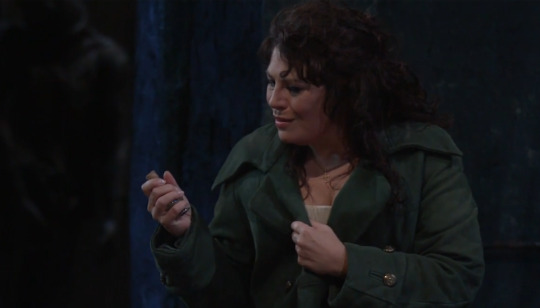
with pictures because I have provided you ample walls of text as it is
Quick aside before we get into the libretto: in part 2 I concluded that both Azucena and Leonora are the only ones who really get what they want in this opera, and I think it’s pretty clear with Azucena... “Sei vendicata, o madre!” (even if we are unclear if she intentionally organized Manrico’s death and/or was conflicted by it or not).
Leonora. “I just came out to have a good time and honestly I’m feeling so attacked right now.” @ Ines, @ di Luna, even @ Manrico at the end
Because, out of everyone in this opera, Leonora is... happy? (I mean, yeah, she’s kind of set 100% of her hopes and dreams on this guy, and when she thinks he’s dead, she’s ready to head to the convent to pray to God until she can be reunited with him in death, saying “un riso, una speranza, un fior
la terra non ha per me!” - earth no longer has for me laughter, hope, or flowers! But look at her circumstances and context, and it’s still a choice she’s making, herself, about how she wants to live. Respect.)
[sociological examination about religious/cultural factors influencing WHY she would make that particular choice: coming to a bookstore near you in 2022]
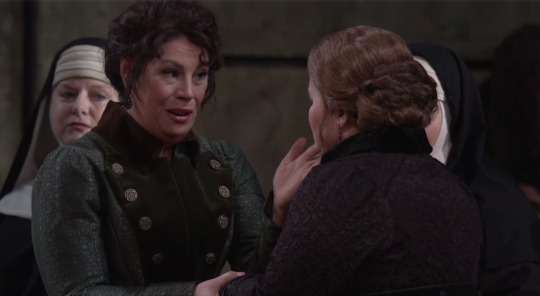
“I swear go God, Ines (literally, I just did) can you just support me for once and trust me on this” (jk I love Ines she’s just doing her best too)
Okay, but to get back to the point... Leonora just has this sparkle. She’s filled with life and joy and happiness in the beginning (and - while yeah, my 21st century feminist me is like *facepalms* don’t make it dependent on another person, especially not a guy, especially not a guy who isn’t really even that focused on you as a person, but more as a possession he has to jealously protect from Rivals - her joy is revived when Marico returns and honestly thank gosh he does, since otherwise di Luna was gonna wreck those convent plans.) ANYWAYS - di Luna clearly sees and wants to possess this sparkle, clearly having none of it himself.
Some exerpts from the libretto of this sparkly joy none of the characters ever get....(di Luna tries, haha...“la gioia che m'aspetta, gioia mortal, non è!“ but learns that maybe trying to seize someone against their will isn’t the best way to Spark Joy)
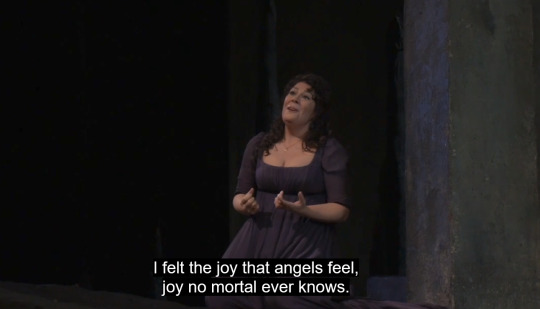
We’ve got Act 1 -
“Gioia provai che agl'angeli solo è provar concesso! ...Di tale amor che dirsi mal può dalla parola...” Joy only the angels can feel...such love that cannot be described by words!
- Act 2, upon rescue by/reunion with her beloved -
“Non regge a tanto giubilo rapito il cor, sorpreso!” My surprised heart cannot bear such joy!
- and finally, Act 4, once she is certain of saving Manrico -
“ Vivrà! Contende il giubilo i detti a me!” He’ll live - my joy strips me of words!
Gosh, for such a tragic opera (if you take it seriously), Leonora is just this bundle of joy. Even in Act 4. It’s impressive.
She just has this energy, and I think it’s some sort of radiance from self-awareness and knowing exactly what she wants. You also may notice Leonora doens’t leave a body count the way di Luna, Manrico, and Azucena do. Well, unless you count herself :( but my point is she’s not about hurting people to get what she wants. And Leonora makes it explicitly clear from Act I: “ S'io non vivrò per esso, per esso morirò” - if I cannot life for him, I will die for him.
Leonora knows what she wants and nothing, NOTHING, and NOBODY is going to get in her way! And HOO BOY does di Luna try! So the convent kidnapping shit he tried to pull with the “not even God can claim [Leonora]” attitude didn’t pan out... but it also proved to Leonora that God wouldn’t necessarily save her (convent-style at least) so she leveled up and remembered OH YEAH PLANTS!
*cue Juliet line*:
“ I'll to the friar, to know his remedy:
If all else fail, myself have power to die.“
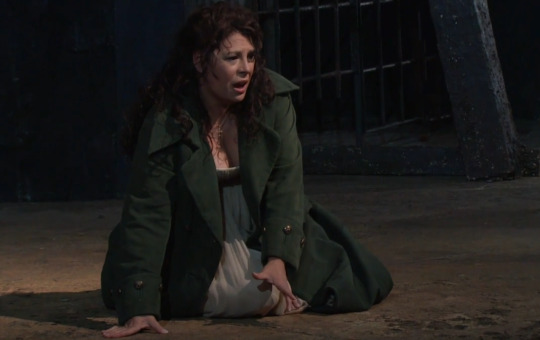
And honestly, she’s badass about it, too. From Act 1, she’s pretty fearless, from the moment Ines expresses fear and doubt about her infatuation with Manrico -
INES: Quanto narrasti di turbamento m'ha piena l'alma! Io temo...
What you say disturbs my soul, I fear [for you!]
LEONORA: Invano!
[You fear] in vain! (or: don’t fear!)
Leonora’s not afraid. She’s simply on a mission. Once Shit Gets Real and di Luna promises to kill Manrico, maintaining strict alignment with Mission “S'io non vivrò per esso, per esso morirò,” asking di Luna to “Piombi, piombi il tuo furoresulla rea che t'oltraggiò, vibra il ferro in questo core che te amar non vuol né può”- Let your fury fall on the evil girl who offended you; plunge your sword into this heart that cannot, will not love you!
[again, not condoning Leonora’s choices, such as throwing herself under the ‘di Luna is going to blame Leonora for all his psycho actions’ Bus, but I respect her making her choices and fighting back]
Of course, di Luna is like “YOU CRAZY!” and literally tells Leonora her blood wouldn’t be enough to quell his rage. “l tuo sangue, o sciagurato, ad estinguerlo fia poco!” - Your blood, wretch, would hardly be enough!
~really playing the romance here~ :)
Leonora doesn’t get the point, since in Act 4, she repeats her pleas to exchange her live for Manrico’s - still not getting the Blood is Not Enough memo, apparently - “Svenami, ti bevi il sangue mio!” - Take me out**, drink my blood!
**no, di Luna, she isn’t asking you out on a date (sorry it’s so hard not to just 100% shitpost this opera) - but I couldn’t find a better translation. You don’t really say “faint me” in English and I don’t think the direct translation is “kill” but “take me out” seemed like an acceptable euphemism.

Of course, Leonora ultimately ends up accomplishing her Mission. [Like I said in part 1, my initial reaction to her self-sacrificial death was just anger and disappointment. But in context, she’s pulling a valid Juliet move... her circumstances are awful and suffocating and there are very few ways out for her in the world she lives in... but she ends up exiting the game on her terms.
{At the subjective level, at least. Objectively, her only choices are a vampire who will suck her life dry [di Luna] - in which life might be merciless - or choosing to withdraw from life with Help from Plants [poison] - in which death is merciful. Again, sociological exploration of Leonora’s CHOICE ARCHITECTURE coming to booksellers near you. Might even include Alternate Ending: running away into the mountains with the gypsies instead, but we all know that isn’t part of Mission “S'io non vivrò per esso, per esso morirò.” Plus I think we are all familiar with the concept that as humans we are more likely to stick with the evil we know rather than strike out into the great unknown. Heck, somebody stop me, these asides will be the death by boredom or exasperation of us all. Wait, are you reading this!??! WOW and bless you!! Thanks and I’m sorry}
Unfortunately, Manrico has to be a little turdball and start cursing Leonora, being the jealous self-centered guy that he ultimately is, before he realizes what she’s done to save him. “Manrico I’m literally dying FOR YOU and this is how you repay me?”
In Act 1, she begs di Luna to see reason through his jealous rage, but by Act 4 it’s her own beloved, the person she’s organized her Life Goal around, who is displaying the same jealous, blinding rage, refusing to listen to her. “Oh come l'ira ti rende cieco! Oh quanto ingiusto, crudel, crudel!” Oh how rage blinds you, how injust, how cruel you are [Manrico]!
Oh, the sweet and cruel irony Leonora getting her unconditional, immense, “eternal” love dismissed because Manrico doesn’t get it the way he wanted it [i.e. uh oh are we going to circle back to possessiveness/jealousy? Is Leonora the only one - and granted, she is a little psycho/obsessed/infatuated à la di Luna, but without trying to POSSESS her object of affection -- who can love in a semi-healthy way in this opera?? apparently]. My poor girl. At least Manrico Comes to his Senses before she dies (just in time for him join Leonora’s fate himself). *sad cheering*
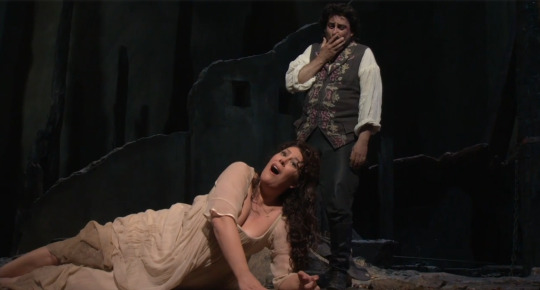
Let me end by emphasizing that Leonora did not die JUST to “save Manrico.” Yes, the libretto says “Prima che d'altri vivere, io volli tua morir! “ - Rather than live as another’s, I wanted to die yours. But to me, it’s pretty clear she’s dying for herself - dying as her own self, as hers (I mean, technically she never became Manrico’s “legal property” anyways if we want to get into the morbid lack of womens’ rights, so she wasn’t even “his” in that way). And in the end, choice architecture aside, the point is that all the way, Leonora knew what she wanted, made her own decisions, stayed true to herself, and accomplished what she set her mind to. Nothing and nobody stopped her. Who’s to say what else she might have wanted if she had had different opportunities, choices, knowledge, or most importantly had been born in a different context.
(*faceplams* had been born?!! She’s a fictional character god Karo go to bed already) (*peels hands off face* it’s okay you are processing outrage over the Female Experience and Leonora represents a lot of real women, living and dead)
I conclude. LEONORA IS UNSTOPPABLE. Let’s part with some lovely lines from our complex (if a bit compulsively devoted), tragic, yet joyful, empowered, and fearless heroine:

Tu vedrai che amore in terra mai del mio non fu più forte:
vinse il fato in aspra guerra, vincerà la stessa morte.
You will see that never on earth was there a stronger love than mine; it defeated Fate in violent strife, it will defeat death itself.
* * * * * * * *
Screencaps from IL Trovatore (Met 2011) ft. Sondra Radvanovsky, Dmitri Hvorostovsky, and Marcelo Álvarez
#first of all this is extremely long and I still don't know how to use keep reading so apologies for the spam#long post#il trovatore#verdi#opera#trovatore#mine#writing tag i suppose#sondra radvanovsky#idk i'm just going to tag her for now#i stayed up til 1am writing this for like. 3 hours. It's fine#im defintiely fine#i guess I just really love Leonora now look how far we've come#watch out if I do one of these for Tatyana Larina :O
23 notes
·
View notes
Photo
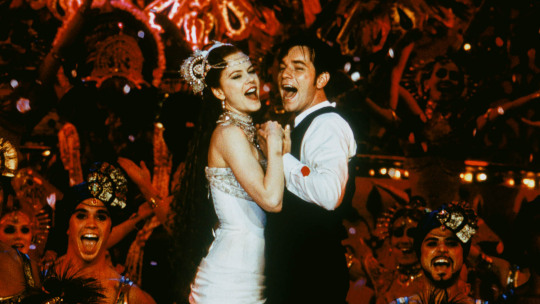
Spectacular Spectacular!
On the twentieth anniversary of its explosion onto big screens, Ella Kemp high-kicks into the Moulin Rouge! once again, accompanied by screenwriter Craig Pearce and a chorus line of jukebox-musical academics and swoony Letterboxd fans.
“You’re always writing for yourself, for the film you want to see. I like all kinds of different films and I think teenage girls do too.” —Craig Pearce, Moulin Rouge! co-writer
This is a story about love. A love born at the turn of the twentieth century in an iconic Parisian cabaret and brought to life in 2001 on Australia’s most spectacular sound stage. A valentine to excess, greed, fantasy and, above all, to the fundamental Bohemian ideals: truth, beauty, freedom and love. This is the story of Moulin Rouge! and how it still burns bright, two decades on, in the hearts of romantics all over the world.
The film, a fateful love story between penniless writer Christian and dazzling courtesan Satine—played by Ewan McGregor and Nicole Kidman—premiered at the Cannes Film Festival on May 9, 2001 and opened in New York and Los Angeles cinemas only weeks later, on May 18. Cast and crew fought hard to get it there: unimaginably, writer-director Baz Luhrmann’s father passed away on the first day of filming, and Kidman’s then-marriage was in turmoil. “There were times of beautiful moments, but there were times where we were like, ‘This is so hard’,” Luhrmann recently told an Australian journalist.
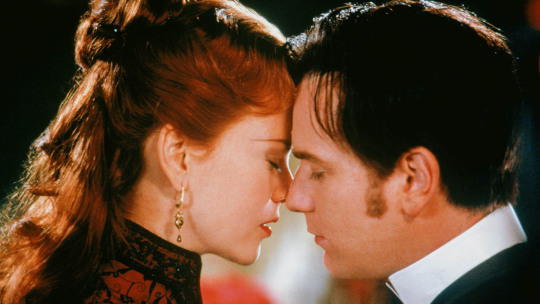
And, though this seems strange to say in a world that has since welcomed Mamma Mia!, Bohemian Rhapsody and Rocketman, making a movie musical early in the millennium was a high-risk pursuit. Luhrmann again: “‘Musicals will never be popular again’ … I can’t tell you how many times I was told that.”
“It’s part of a cycle,” explains Dr. Eleonora Sammartino, an academic specializing in contemporary American film musicals. “It came after a period in the 1990s where musicals had disappeared from the big screen.” Lisa Duffy, Letterboxd member and Doctor of Hollywood Musicals, agrees: “Films coming out [that year] were a lot more dour, so this was a real gamble.”
Nobody understood this gamble better than the film’s co-writer, Craig Pearce, who has been Luhrmann’s close friend and professional partner since the pair were students together. Moulin Rouge! is the third and final entry in what we now know as their red-curtain trilogy, alongside Strictly Ballroom (1992) and Romeo + Juliet (1996).
“Baz had been thinking about the parallels between the Moulin Rouge and Andy Warhol’s Factory,” Pearce recalls. “Places where artists congregate, where it’s more than a place, it’s a petri dish of creativity. Like The Factory, and Studio 54, the Moulin Rouge was a place where the old and the wealthy pay a lot of money to hang out with the young and the sexy.”
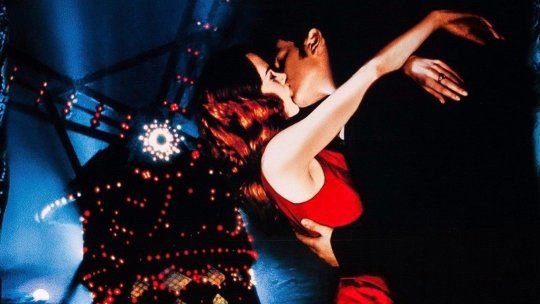
At the end of the twentieth century, however, the Moulin Rouge wasn’t all that great (the original had burnt down in 1915). Pearce recalls: “We went to Paris in 1999 on a research trip and discovered, to our horror, that the Moulin Rouge now is just a hideous tourist trap. So we had to go on this journey to find out how this amazing creativity—artists and dancers and musicians—came out of what now feels like this tawdry girlie show.”
With the location and period locked in, Pearce and Luhrmann worked to find the story’s driving force. “This movie wouldn’t work without the exclamation point,” writes Adelaide. Pearce is the first to admit this: “It’s saying it’s Moulin Rouge, but it’s not that one. What we’re trying to do is heighten truth, but you have to start with that underlying truth,” he explains. “It’s not casting around for ‘what would be a cool idea’ because you never come up with one. It’s never as interesting as the truth. Like, there was an elephant in the garden of the Moulin Rouge. And why does that matter? It matters because there are certain inherent logics in the way human beings operate.”
“It's a musical of recycled parts. It’s a story which, beat for beat, has been told for centuries. It’s a staged show drawn from the lives of the characters themselves… This is a film [that] is bold enough not just to say that all art is about finding your own meanings behind someone else’s ideas, and that all art is just copying and stealing, but that this can be totally valid and authentic. When Nicole Kidman sings ‘Your Song’ to the Duke, she’s stealing from the writer, and Luhrmann is stealing from Elton John. But when Ewan McGregor is singing to Kidman, it’s the most magical moment you could possibly imagine. That’s what makes ‘Moulin Rouge!’ a true masterpiece. Cinema has never been more fake, and cinema has rarely been more real.” —Sam
Moulin Rouge! borrows from all over. There are hints of La Traviata, of Cabaret and of Émile Zola’s Nana. There were Toulouse Lautrec’s paintings (John Leguizamo tremendously embodies the painter in the film), Baudelaire and Verlaine’s literature, Jason and the Argonauts, Homer’s Odyssey, and the revues of the 1920s and ’30s. “Moulin Rouge! really embraces that vaudevillian component,” says Dr. Hannah Robbins, a Broadway and Hollywood musicals specialist.


Craig Pearce and Baz Luhrmann writing in Paris (1998) and New York (2019). / Photos from Luhrmann’s Twitter
“This genre lends itself to repetition and fragmentation,” Sammartino expands. “It’s part of the syntax of the musical and has always been, this idea of borrowing from other sources. This doesn’t take away from the daring postmodern approach Moulin Rouge! is defined by, it’s simply further proof that it’s, well, a very good musical.”
Above all else, the core of Moulin Rouge! is inspired by the myth of Orpheus of Thrace and his doomed love affair with the beautiful Eurydice, whom he followed into Hades after she died. “The show must go on, Satine,” the nightclub’s impresario Harold Zidler grimly tells his star, as their world begins to crumble. “We’re creatures of the underworld. We can’t afford to love.”
It wasn’t the first time Pearce and Luhrmann had looked to ancient mythology. Strictly Ballroom’s mantra, which tells us “a life lived in fear is a life half lived” owes everything to David and Goliath. But with the Orphean myth, the screenwriters were looking to dig deeper, to find something much darker. “The Orphean myth is a romantic tragedy in its essence,” Pearce explains. “David and Goliath is more youthful, and it’s about saying that belief can conquer anything. But as you get older people get sick, they die, and life is about resilience and finding ways to embrace the hard things in life and move forward.”
That might sound antithetical to the all-singing, all-dancing nature of the movie musical, but the genre has been trying to tell devastating stories like Moulin Rouge! for decades. “Hollywood is rarely interested in buying and remaking stories with devastating endings as much as stage musicals are,” Duffy explains. (See: Les Misérables, Phantom of the Opera.)
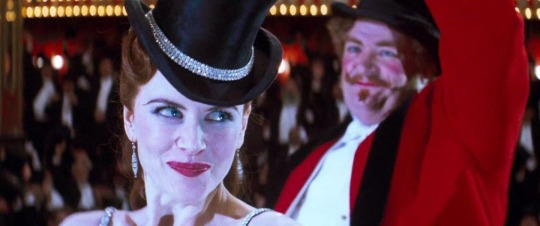
This reluctance can be traced back to the classic era, during which there were rules about the ways a musical could end under the censorship laws of the Production Code. Simply put, they had to have a happy ending. (Which also led to a fair amount of bizarre deus ex machina to guarantee a nice, cheery final act).
But then in the 1960s the Code fades away, and Hollywood starts engaging with violence, sex and explicit trauma on-screen. “We have much more freedom in the contemporary era to have people die explicitly,” Duffy says. “And that’s why we keep returning to Moulin Rouge!: there’s the explicit negotiation of our entry into the fantasy world, and then we’re devastated, and the curtains close and we’re in reality again.”
“It’s one of the great 21st-century films. Baz Luhrmann is only good when figuring out how to make historical periods of excess into contemporary displays of grotesquerie, somehow turning great films (‘French Cancan’) or great literature (‘The Great Gatsby’) into tacky Technicolor vomit that somehow understands the underlying sorrow of the material better than any serious-minded adaptation.” —Jake
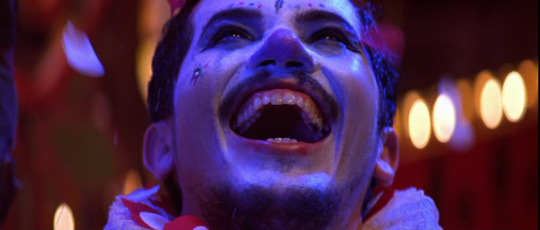
The red-curtain trilogy has a distinct set of rules: one, the viewer must know how the film ends from the start; two, the story must be set in a heightened world; and three, it must contain a device that keeps the audience awake at all times, whether that be ballroom dancing, scattershot Shakespearean dialogue, or pop songs.
“Part of the appeal of the artifice is that it gives the audience permission to say, ‘This isn’t real, you’re about to see a fantasy, and that’s okay,’” Duffy says. “The pleasure is the fantasy of it. The whole film is us seeing how Christian is imagining what happened—and the musical is the most extreme genre that allows such imagination.”
The point was never to temper the elaborate, hyper-aware fakeness of it all, but to really commit to it. Says Robbins, “Musicals are ultimately artificial and exclusively constructed. And that’s what Moulin Rouge! achieves and quite a lot of films don’t. It goes, ‘This is where the story is going, this is the energy, this will be played in the soundtrack.’ There’s a deliberate thought process there.”
Luhrmann recently said: “The way we made the movie is the way the movie is.” An under-explored aspect of Moulin Rouge! is how the whole affair, with its ‘Spectacular Spectacular’ musical-within-a-musical device, is an insider’s guide to the mechanics and politics of making ‘big art’. How money can control both the art (the dastardly Duke insisting on “his” ending), and the artists (Satine is never told she is dying, because she is the golden goose upon whose shoulders the success of the company rests; Christian is likewise left in the dark, because he is the scriptwriter who needs to finish writing the show. Both are wrung dry for their talents).
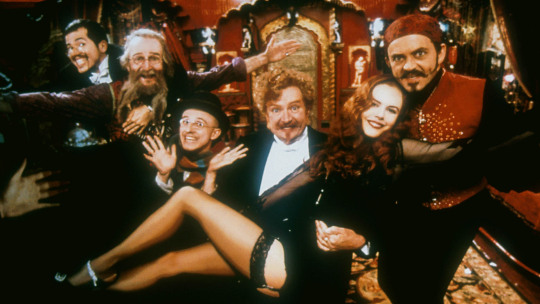
There are shades of Luhrmann in Zigler, the impresario juggling cast, crew, investors and opening dates (Moulin Rouge! was originally slated for December 2000). Christian and friends in playwriting mode are surely Pearce and Luhrmann themselves, searching for the most economical way to say “the hills are vital, intoning the descant”.
And, from the show-within-a-show rehearsals, to the bustle of the backstage, to the gun-chase through the wooden bones of the fly tower, the production details are Catherine Martin to the very last diamante. Nobody does daring bedazzlement quite like ‘CM’, Luhrmann’s fellow producer and life partner. Electricity was the new, exciting thing in Paris at the turn of the twentieth century and this film was lit.
A necklace worn by Satine as a gift from the Duke was made of real diamonds and platinum. Designed by Stefano Canturi, It was the most expensive piece of jewellery ever specifically made for a film, with 1,308 diamonds weighing 134 carats, and worth an estimated one million dollars. Needless to say, Martin won both costume and production design Oscars for the film.

Also among the film’s eight Academy Award nominees: editor Jill Bilcock, about whose singular craft there is a recent documentary. Her breathless, kaleidoscopic cutting (also deployed in Strictly Ballroom and Romeo + Juliet) dropped us right on the dance floor; one 65-second sequence contained a boggling 85 cuts. And this is on the back of her superbly judged opening, a scene that repeats itself as she places Christian at both the start of his love story, and its devastating aftermath—heartbroken, unshaven, self-medicating, reaching for the words to begin making sense of his loss.
“I wondered, for the first hour of this, how Baz Luhrmann had managed to balance such in-your-face stylistic audacity while maintaining a genuine feeling of care for the characters and their struggles—is it all down to Ewan McGregor’s wonderfully earnest face, or the way Nicole Kidman’s smouldering-temptress persona is worn down by one of the most charming cinematic uses of Elton John’s ‘Your Song’? But as the ‘Elephant Love Medley’ transformed into David Bowie’s ‘Heroes’, I stopped caring, I just swooned.” —Kat
If electricity was the thing that drove the kids wild in the 1900s, the internet was on everyone’s minds in 2001. We were just figuring out how to juggle tabs and text people. The real magic dust sprinkled throughout Moulin Rouge! is, obviously, the cacophonous soundtrack, which made sense to our collective, fragmented consciousness.
“No other musical of the modern era has so perfectly captured the sense of spinning an iPod wheel every 45 seconds to play something else,” writes Jake of the medley of songs by David Bowie, Fat Boy Slim, Nirvana, Police, Elton John, Rufus Wainwright, Madonna and many others.
Luhrmann and Pearce stopped at nothing to get every single track from every single artist they wanted. The journey took more than two years, and some bodies were left at the side of the road. “You constantly have to kill your darlings,” Pearce sighs. RIP to Rod Stewart’s ‘Tonight’s the Night’, The Rolling Stones’ ‘Under My Thumb’, Prince’s ‘Raspberry Beret’ and Fifth Dimension’s ‘Up, Up and Away’. (Hot air balloons were big in 2001.)
"We wanted the music to be modern, because we didn’t want it to feel like a fusty, crusty world,” says Pearce. “We wanted to find the universal modern parallels that have existed since time immemorial.” But it wasn’t just about finding the most popular songs at the time. “The structure had to be driven by the needs of the story,” the screenwriter explains. “The musicals on film that tend to fail are the ones where the music feels like a film clip. If it’s not serving the emotional needs of the story, you very quickly check out and it becomes boring. With good musical storytelling, it builds and builds to a point where you can’t do anything but express yourself through song.”

Has there ever been a more desperately romantic promise than when Christian starts telling Satine he doesn’t have much to give her, before nailing that one perfect high note to reassure her that his gift is his song? Why, yes: when the mirrored love stories of Christian and Satine, and of the penniless sitar player and the courtesan in ‘Spectacular Spectacular’, meet at their dramatic peak, with ‘Come What May’. (The film’s only original song, it had been submitted for the Romeo + Juliet soundtrack by writers David Baerwald and Kevin Gilbert.)
“Moulin Rouge! was successful because it was using songs from different ages and periods, appealing to different audiences with something they could have a connection to. So it wasn’t just boomers, not just millennial or Gen X,” says Sammartino. “Something like Rock of Ages, for example, was much more narrow in terms of the kind of music you needed to like.”
“This film is a dramatic bitch and I love her.” —Mulaney
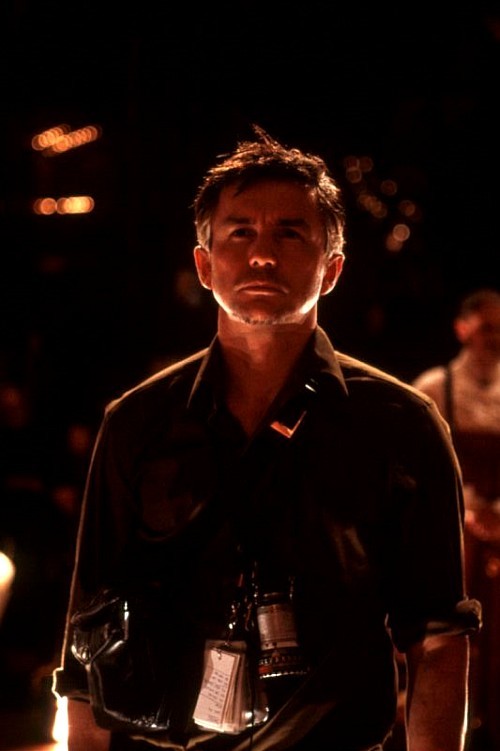
‘Moulin Rouge!’ co-writer and director Baz Luhrmann.
There is a pattern to our most emphatic reviews for the film: they come from relatively young people, who mainly identify as women. It’s something critics anticipated back in 2001. The New York Times wrote, in a fairly ambivalent review, that “young audiences, especially girls, will feel as if they had found a movie that was calling them by name”. We don’t have time to fully dig into the antiquated notion that “low art” (the publication’s quippy headline for that review was “An Eyeful, an Earful, Anachronism”) is aimed specifically at women, but surely we have to ask the question twenty years on: does anyone still think this could possibly be true?
“You’re always writing for yourself, for the film you want to see,” says Pearce. “I like all kinds of different films and I think teenage girls do too.” And let’s remember, it was Harry Styles who said of the broad demographic of his fanbase back in 2017: “Teenage girls—they don’t lie. If they like you, they're there. They don’t act ‘too cool’. They like you, and they tell you.”
Robbins: “The rom-com has made the connection between song and emotional display about female pain. The Emma Thompson crying to Joni Mitchell kind of lineage has tempered musicals—people think that’s what Mamma Mia! is: women and mothers and daughters and feelings.” Dig a little deeper and you’ll find a lot of musical-related data suggesting a broader scope. “When I went to see Frozen on Broadway, kids of all genders were wearing Olaf costumes, much more than princess ones. That is not the narrative Disney would like. And when people gender musicals and think of the princesses franchises, they don’t look to the fact that The Lion King and Aladdin were more successful.”

There has been an undeniable effort to reel male audiences in to see 21st-century musicals. On Hugh Jackman’s welcome, flamboyant career pivot (surprising to anyone but Australians), Duffy says: “Casting Wolverine in Les Misérables and The Greatest Showman is very, ‘See, manly men can do it too!’” Let’s not forget that Ewan McGregor had gotten his big break as freewheeling heroin addict Mark Renton in Danny Boyle’s Trainspotting just six years prior to playing Christian.
Indeed, says Duffy, “more of my male friends have seen Moulin Rouge! than other musicals. The MTV tone might have been significant, and there was the ‘Lady Marmalade’ music video—the fact you have all these beautiful pop stars writhing around in corsets. And just having David Bowie on the soundtrack is like, ‘Okay, this isn’t just girl music.’ Pop music offers an easier way to move past the stigma of show tunes.”
Crucially, Robbins notes that all of this prejudice, and the effort to tear it down, is speaking to, and about, a very specific—cisgender, heterosexual—subsection of audiences. “I always wonder where the critics think the queer audiences are. I do wonder if there’s a cis-het vibe going on that has even more to do with it, reinforcing that norm rather than actually focusing on young girls as an audience.”

I asked my interviewees whether they thought, twenty years on, that Moulin Rouge! would be better received today—and which parts of our contemporary cinematic and musical fabric owe a debt to Luhrmann’s jukebox wonder. “We’re more receptive but we have specific demands,” says Robbins. “And today’s musicals sink or swim on whether they meet those demands. So The Greatest Showman is the Moulin Rouge! of now. I think people would be lying if they didn’t say that the cinematography in Moulin Rouge! hasn’t affected almost every movie musical that has been made since. We wouldn’t have ‘Rewrite the Stars’ if we didn’t have ‘Sparkling Diamonds’.”
Duffy agrees: “So many things that come after you can draw a line directly to Moulin Rouge!—Pitch Perfect, Rock of Ages, Happy Feet… but most significantly, Glee would not exist without this movie. The jukebox musicals of the 21st century owe everything to Moulin Rouge! and the blueprint it lays down.”
Among the films that premiered at Cannes in 2001—David Lynch’s Mulholland Drive, Michael Haneke’s The Piano Teacher—was another kooky little number: Andrew Adamson and Vicky Jenson’s animated Shrek. Two jukebox musicals in the same prestige film festival, at a moment when the genre was considered deeply uncool? What a time to be alive!

If the last eighteen months have taught us anything, it’s that we film lovers enjoy nothing more than a comfort rewatch of our favorites. Moulin Rouge! and Shrek (and French Shrek) delivered untold comfort in the pandemic—but they had also soothed us much earlier, in the months following the unspeakable tragedy of the 9/11 attacks.
“For me it was very much a comfort film,” recalls Duffy, who had discovered Moulin Rouge! as a fresh-faced eighteen-year-old, during her first year away from home, studying in New York. “Part of that was rooted in this really traumatic thing that had happened, and all of us wanting to escape into this fantasy world as much as possible.”
Luhrmann said, in his recent Australian interview, “I love to see people united and uplifted and exulted. It’s a privilege to be a part of helping people find that.” As life outside our homes resumes, Moulin Rouge! will very much be part of a return to exultant living. The live musical—interrupted by Covid—opens in Melbourne in August and on the West End and Broadway in the fall.
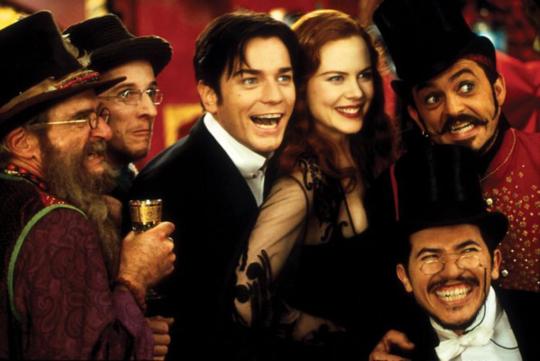
Pearce last saw the film on a large screen in a derelict warehouse in London, at Secret Cinema’s interactive, carnivalesque spectacular. “I have to say, I was really proud of the film,” the screenwriter says, finally letting himself speak fondly of his accomplishment well over an hour into our conversation.
“I mean, some people liked it back in the day, but you’re never really satisfied with your work. You just tend to see the things that could have been better. But seeing the love for the film was really, really emotional.”
Related content
Follow Ella on Letterboxd
Craig Pearce is currently producing ‘Pistol’—a biopic miniseries on the Sex Pistols, directed by Danny Boyle—and his next film with Luhrmann is a biopic of Elvis Presley, with Austin Butler playing the king of rock and roll. Additional thanks to Dr. Eleonora Sammartino, Lisa Duffy and Dr. Hannah Robbins.
#moulin rouge#moulin rouge!#baz luhrmann#catherine martin#nicole kidman#ewan mcgregor#children of the revolution#truth beauty freedom love#musical#movie musical#jukebox musical#paris#australian director#letterboxd
8 notes
·
View notes
Note
I kind of agree with you on the evak question. Elu (and now nicotino after watching 4th season and actually liking their coupling a lot) and evak were the only ones that I thought that would be lifetime as well. And I never thought about it, but the symbolism in both seasons are what set that home for me and I never thought about it but it’s so true. Remakes are remakes but what skam fr did so well was make that symbolism and made it their own thing which puts more weight in the relationship
Tbh I was never a huge fan of Nicotino and I haven't seen s4 so I'll leave that up to you.
For the rest : yes. The symbolism served to broaden the scope of those relationships immensely. You had the feeling that this was not just two teens meeting and crushing on each other, but two humans engaging in the beginning of a lifelong journey. Of course there are the messy moments of a romance at that age. But there is also a lot that feels...beyond that.
For OG for example ; the baptism/Christmas symbolism indicate rebirth, the start of a new life ; redemption and christ-like love but this time without the need for sacrifice, only compassion and self acceptance. Similarly, Romeo and Juliet but reversed, no need for tragedy. These are epic references, and they indicate that the triumph of love will go on for a long time because that's the purpose of the reversal - what is most epic is not death at the peak but a long life full of love, with all its ups and downs. Even though Isak says he is unsure if they will last, those references inscribe their love as something continuous.
And skam france : there is this notion of home and sanctuary, their love taking on the qualities of la Petite Ceinture ; and Lucas seeing Eliott and their love as his "church/religion/faith", bringing him safety and joy ; and then we see them building a home together in later seasons and it feels really necessary to their story, in a sense, and it doesn't feel absurd for them to talk about marriage bc there was this theme of domesticity present with them at the start ; similarly this faith process is about them getting each other out of the dark, it's a question and an insecurity but the purpose of faith is exactly pushing through fear and insecurity and uncertainty and the entire point of this life they have been building together arguably since one of the first things Eliott did was giving Lucas food - in short they are so married lmao. Of course they have issues - but Polaris, their "foundational myth", exactly provides the answer to what they will do - reach through incomprehension, darkness, different worlds ; towards each other. So of course they will last and work through whatever storm they have, it's at the very core of who they are as a couple; if you break that, you break their entire story.
So to me really the remakes who lightened the symbolism (and made it less religious, which to me was a very important part as well) really missed the mark imho (although maybe I was less able to get it idk) because it's such a huge part of the appeal of the story to me tbh, especially since we get so little queer romance with that sort of eternal appeal
37 notes
·
View notes
Photo

The Captive Lover – An Interview with Jacques Rivette, Frédéric Bonnaud
(September 2001)
Translation by Kent Jones
This interview was originally published in Les Inrockuptibles (25 March 1998) and has been republished here with the kind permission of the author.
* * *
I guess I like a lot of directors. Or at least I try to. I try to stay attentive to all the greats and also the less-than-greats. Which I do, more or less. I see a lot of movies, and I don’t stay away from anything. Jean-Luc sees a lot too, but he doesn’t always stay till the end. For me, the film has to be incredibly bad to make me want to pack up and leave. And the fact that I see so many films really seems to amaze certain people. Many filmmakers pretend that they never see anything, which has always seemed odd to me. Everyone accepts the fact that novelists read novels, that painters go to exhibitions and inevitably draw on the work of the great artists who came before them, that musicians listen to old music in addition to new music… so why do people think it’s strange that filmmakers – or people who have the ambition to become filmmakers – should see movies? When you see the films of certain young directors, you get the impression that film history begins for them around 1980. Their films would probably be better if they’d seen a few more films, which runs counter to this idiotic theory that you run the risk of being influenced if you see too much. Actually, it’s when you see too little that you run the risk of being influenced. If you see a lot, you can choose the films you want to be influenced by. Sometimes the choice isn’t conscious, but there are some things in life that are far more powerful than we are, and that affect us profoundly. If I’m influenced by Hitchcock, Rossellini or Renoir without realizing it, so much the better. If I do something sub-Hitchcock, I’m already very happy. Cocteau used to say: “Imitate, and what is personal will eventually come despite yourself.” You can always try.
Europa 51 (Roberto Rossellini, 1952)
Every time I make a film, from Paris nous appartient (1961) through Jeanne la pucelle (1994), I keep coming back to the shock we all experienced when we first saw Europa 51. And I think that Sandrine Bonnaire is really in the tradition of Ingrid Bergman as an actress. She can go very deep into Hitchcock territory, and she can go just as deep into Rossellini territory, as she already has with Pialat and Varda.
Le Samourai (Jean-Pierre Melville, 1967)
I’ve never had any affinity for the overhyped mythology of the bad boy, which I think is basically phony. But just by chance, I saw a little of L’Armée des ombres (1969) on TV recently, and I was stunned. Now I have to see all of Melville all over again: he’s definitely someone I underrated. What we have in common is that we both love the same period of American cinema – but not in the same way. I hung out with him a little in the late ’50s; he and I drove around Paris in his car one night. And he delivered a two-hour long monologue, which was fascinating. He really wanted to have disciples and become our “Godfather”: a misunderstanding that never amounted to anything.
The Secret Beyond the Door (Fritz Lang, 1948)
The poster for Secret Défense (1997) reminded us of Lang. Every once in a while during the shoot, I told myself that our film had a slim chance of resembling Lang. But I never set up a shot thinking of him or looking to imitate him. During the editing (which is when I really start to see the film), I saw that it was Hitchcock who had guided us through the writing (which I already knew) and Lang who guided us through the shooting: especially his last films, the ones where he leads the spectator in one direction before he pushes them in another completely different direction, in a very brutal, abrupt way. And then this Langian side of the film (if in fact there is one) is also due to Sandrine’s gravity.
The Night of the Hunter (Charles Laughton, 1955)
The most seductive one-shot in the history of movies. What can you say? It’s the greatest amateur film ever made.
Dragonwyck (Joseph L. Mankiewicz, 1946)
I knew his name would come up sooner or later. So, I’m going to speak my peace at the risk of shocking a lot of people I respect, and maybe even pissing a lot of them off for good. His great films, like All About Eve (1950) or The Barefoot Contessa (1954), were very striking within the parameters of contemporary American cinema at the time they were made, but now I have no desire whatsoever to see them again. I was astonished when Juliet Berto and I saw All About Eve again 25 years ago at the Cinémathèque. I wanted her to see it for a project we were going to do together before Céline and Julie Go Boating (1974). Except for Marilyn Monroe, she hated every minute of it, and I had to admit that she was right: every intention was underlined in red, and it struck me as a film without a director! Mankiewicz was a great producer, a good scenarist and a masterful writer of dialogue, but for me he was never a director. His films are cut together any which way, the actors are always pushed towards caricature and they resist with only varying degrees of success. Here’s a good definition of mise en scène – it’s what’s lacking in the films of Joseph L. Mankiewicz. Whereas Preminger is a pure director. In his work, everything but the direction often disappears. It’s a shame that Dragonwyck wasn’t directed by Jacques Tourneur.
The Big Sleep (Howard Hawks, 1946)
It’s Chandler’s greatest novel, his strongest. I find the first version of the film – the one that’s about to be shown here – more coherent and “Hawksian” than the version that was fiddled with and came out in ’46. If you want to call Secret Défense a policier, it doesn’t bother me. It’s just that it’s a policier without any cops. I’m incapable of filming French cops, since I find them 100% un-photogenic. The only one who’s found a solution to this problem is Tavernier, in L.627 (1992) and the last quarter of L’Appât (1995). In those films, French cops actually exist, they have a reality distinct from the Duvivier/Clouzot “tradition” or all the American clichés. In that sense, Tavernier has really advanced beyond the rest of French cinema.
Vertigo (Alfred Hitchcock, 1958)
Of course we thought about it when we made Secret Défense, even if dramatically, our film is Vertigo in reverse. Splitting the character of Laure Marsac into Véronique/Ludivine solved all our scenario problems, and above all it allowed us to avoid a police interrogation scene. During the editing, I was struck by the “family resemblance” between the character of Walser and the ones played by Laurence Olivier in Rebecca (1940) and Cary Grant in Suspicion (1941). The source for each of these characters is Heathcliff in Wuthering Heights, which brings us back to Tourneur, since I Walked with a Zombie (1943) is a remake of Jane Eyre.
I could never choose one film by Hitchcock; I’d have to take the whole oeuvre (Secret Défense could actually have been called Family Plot [1976]). But if I had to choose just one film, it would be Notorious (1946), because of Ingrid Bergman. You can see this imaginary love affair between Bergman and Hitchcock, with Cary Grant there to put things in relief. The final sequence might be the most perfect in film history, in the way that it resolves everything in three minutes – the love story, the family story and the espionage story, in a few magnificent, unforgettable shots.
Mouchette (Robert Bresson, 1966)
When Sandrine and I first started talking – and, as usual, I didn’t know a thing about the film I wanted to make – Bernanos and Dostoyevsky came up. Dostoyevsky was a dead end because he was too Russian. But since there’s something very Bernanos-like about her as an actress in the first place, I started telling her my more or less precise memories of two of his novels: A Crime, which is completely unfilmable, and A Bad Dream, a novel that he kept tucked away in his drawer, in which someone commits a crime for someone else. In A Bad Dream, the journey of the murderess was described in even greater length and detail than Sandrine’s journey in Secret Défense.
It’s because of Bernanos that Mouchette is the Bresson film I like the least. Diary of a Country Priest (1950), on the other hand, is magnificent, even if Bresson left out the book’s sense of generosity and charity and made a film about pride and solitude. But in Mouchette, which is Bernanos’ most perfect book, Bresson keeps betraying him: everything is so relentlessly paltry, studied. Which doesn’t mean that Bresson isn’t an immense artist. I would place Trial of Joan of Arc (1962) right up there with Dreyer’s film. It burns just as brightly.
Under the Sun of Satan (Maurice Pialat, 1987)
Pialat is a great filmmaker – imperfect, but then who isn’t? I don’t mean it as a reproach. And he had the genius to invent Sandrine – archeologically speaking – for A nos amours (1983). But I would put Van Gogh (1991) and The House in the Woods (1971) above all his other films. Because there he succeeded in filming the happiness, no doubt imaginary, of the pre-WWI world. Although the tone is very different, it’s as beautiful as Renoir.
But I really believe that Bernanos is unfilmable. Diary of a Country Priest remains an exception. In Under the Sun of Satan, I like everything concerning Mouchette [Sandrine Bonnaire’s character], and Pialat acquits himself honorably. But it was insane to adapt the book in the first place since the core of the narrative, the encounter with Satan, happens at night – black night, absolute night. Only Duras could have filmed that.
Home from the Hill (Vincente Minnelli, 1959)
I’m going to make more enemies…actually the same enemies, since the people who like Minnelli usually like Mankiewicz, too. Minnelli is regarded as a great director thanks to the slackening of the “politique des auteurs.” For François, Jean-Luc and me, the politique consisted of saying that there were only a few filmmakers who merited consideration as auteurs, in the same sense as Balzac or Molière. One play by Molière might be less good than another, but it is vital and exciting in relation to the entire oeuvre. This is true of Renoir, Hitchcock, Lang, Ford, Dreyer, Mizoguchi, Sirk, Ozu… But it’s not true of all filmmakers. Is it true of Minnelli, Walsh or Cukor? I don’t think so. They shot the scripts that the studio assigned them to, with varying levels of interest. Now, in the case of Preminger, where the direction is everything, the politique works. As for Walsh, whenever he was intensely interested in the story or the actors, he became an auteur – and in many other cases, he didn’t. In Minnelli’s case, he was meticulous with the sets, the spaces, the light…but how much did he work with the actors? I loved Some Came Running (1958) when it came out, just like everybody else, but when I saw it again ten years ago I was taken aback: three great actors and they’re working in a void, with no one watching them or listening to them from behind the camera.
Whereas with Sirk, everything is always filmed. No matter what the script, he’s always a real director. In Written On the Wind (1956), there’s that famous Universal staircase, and it’s a real character, just like the one in Secret Défense. I chose the house where we filmed because of the staircase. I think that’s where all dramatic loose ends come together, and also where they must resolve themselves.
That Obscure Object of Desire (Luis Buñuel, 1977)
More than those of any other filmmaker, Buñuel’s films gain the most on re-viewing. Not only do they not wear thin, they become increasingly mysterious, stronger and more precise. I remember being completely astonished by one Buñuel film: if he hadn’t already stolen it, I would have loved to be able to call my new film The Exterminating Angel! François and I saw El when it came out and we loved it. We were really struck by its Hitchcockian side, although Buñuel’s obsessions and Hitchcock’s obsessions were definitely not the same. But they both had the balls to make films out of the obsessions that they carried around with them every day of their lives. Which is also what Pasolini, Mizoguchi and Fassbinder did.
The Marquise of O… (Eric Rohmer, 1976)
It’s very beautiful. Although I prefer the Rohmer films where he goes deep into emotional destitution, where it becomes the crux of the mise en scène, as in Summer, The Tree, the Mayor and the Mediathèque and in a film that I’d rank even higher, Rendez-vous in Paris (1995). The second episode is even more beautiful than the first, and I consider the third to be a kind of summit of French cinema. It had an added personal meaning for me because I saw it in relation to La Belle noiseuse (1991) – it’s an entirely different way of showing painting, in this case the way a painter looks at canvases. If I had to choose a key Rohmer film that summarized everything in his oeuvre, it would be The Aviator’s Wife (1980). In that film, you get all the science and the eminently ethical perversity of the Moral Tales and the rest of the Comedies and Proverbs, only with moments of infinite grace. It’s a film of absolute grace.
Twin Peaks: Fire Walk with Me (David Lynch, 1992)
I don’t own a television, which is why I couldn’t share Serge Daney’s passion for TV series. And I took a long time to appreciate Lynch. In fact, I didn’t really start until Blue Velvet (1986). With Isabella Rossellini’s apartment, Lynch succeeded in creating the creepiest set in the history of cinema. And Twin Peaks, the Film is the craziest film in the history of cinema. I have no idea what happened, I have no idea what I saw, all I know is that I left the theater floating six feet above the ground. Only the first part of Lost Highway (1996) is as great. After which you get the idea, and by the last section I was one step ahead of the film, although it remained a powerful experience right up to the end.
Nouvelle Vague (Jean-Luc Godard, 1990)
Definitely Jean-Luc’s most beautiful film of the last 15 years, and that raises the bar pretty high, because the other films aren’t anything to scoff at. But I don’t want to talk about it…it would get too personal.
Beauty and the Beast (Jean Cocteau, 1946)
Along with Les Dames du Bois de Boulogne (1945), it was the key French film for our generation – François, Jean-Luc, Jacques Demy, myself. For me, it’s fundamental. I saw Beauty and the Beast in ’46 and then I read Cocteau’s shooting diary – a hair-raising shoot, which hit more snags than you can imagine. And eventually, I knew the diary by heart because I re-read it so many times. That’s how I discovered what I wanted to do with my life. Cocteau was responsible for my vocation as a filmmaker. I love all his films, even the less successful ones. He’s just so important, and he was really an auteur in every sense of the word.
Les Enfants terribles (Jean Cocteau, 1950)
A magnificent film. One night, right after I’d arrived in Paris, I was on my way home. And as I was going up rue Amsterdam around Place Clichy, I walked right into the filming of the snowball fight. I stepped onto the court of the Théâtre de l’Oeuvre and there was Cocteau directing the shoot. Melville wasn’t even there. Cocteau is someone who has made such a profound impression on me that there’s no doubt he’s influenced every one of my films. He’s a great poet, a great novelist, maybe not a great playwright – although I really love one of his plays, The Knights of the Round Table, which is not too well known. An astonishing piece, very autobiographical, about homosexuality and opium. Chéreau should stage it. You see Merlin as he puts Arthur’s castle under a bad charm, assisted by an invisible demon named Ginifer who appears in the guise of three different characters: it’s a metaphor for all forms of human dependence. In Secret Défense, the character of Laure Mersac probably has a little of Ginifer in her.
Cocteau is the one who, at the end of the ’40s, demonstrated in his writing exactly what you could do with faux raccords, that working in a 180-degree space could be great and that photographic unity was a joke: he gave these things a form and each of us took what he could from them.
Titanic (James Cameron, 1997)
I agree completely with what Jean-Luc said in this week’s Elle: it’s garbage. Cameron isn’t evil, he’s not an asshole like Spielberg. He wants to be the new De Mille. Unfortunately, he can’t direct his way out of a paper bag. On top of which the actress is awful, unwatchable, the most slovenly girl to appear on the screen in a long, long time. That’s why it’s been such a success with young girls, especially inhibited, slightly plump American girls who see the film over and over as if they were on a pilgrimage: they recognize themselves in her, and dream of falling into the arms of the gorgeous Leonardo.
Deconstructing Harry (Woody Allen, 1997)
Wild Man Blues (1997) by Barbara Kopple helped me to overcome my problem with him, and to like him as a person. In Wild Man Blues, you really see that he’s completely honest, sincere and very open, like a 12-year old. He’s not always as ambitious as he could be, and he’s better on dishonesty than he is with feelings of warmth. But Deconstructing Harry is a breath of fresh air, a politically incorrect American film at long last. Whereas the last one was incredibly bad. He’s a good guy, and he’s definitely an auteur. Which is not to say that every film is an artistic success.
Happy Together (Wong Kar-wai, 1997)
I like it very much. But I still think that the great Asian directors are Japanese, despite the critical inflation of Asia in general and of Chinese directors in particular. I think they’re able and clever, maybe a little too able and a little too clever. For example, Hou Hsiao-hsien really irritates me, even though I liked the first two of his films that appeared in Paris. I find his work completely manufactured and sort of disagreeable, but very politically correct. The last one [Goodbye South, Goodbye, 1996] is so systematic that it somehow becomes interesting again but even so, I think it’s kind of a trick. Hou Hsiao-hsien and James Cameron, same problem. Whereas with Wong Kar-wai, I’ve had my ups and downs, but I found Happy Together incredibly touching. In that film, he’s a great director, and he’s taking risks. Chungking Express (1994) was his biggest success, but that was a film made on a break during shooting [of Ashes of Time, 1994], and pretty minor. But it’s always like that. Take Jane Campion: The Piano (1993) is the least of her four films, whereas The Portrait of a Lady (1996) is magnificent, and everybody spat on it. Same with Kitano: Fireworks (1997) is the least good of the three of his films to get a French release. But those are the rules of the game. After all, Renoir had his biggest success with Grand Illusion (1937).
Face/Off (John Woo, 1997)
I loathe it. But I thought A Better Tomorrow (1986) was awful, too. It’s stupid, shoddy and unpleasant. I saw Broken Arrow (1996) and didn’t think it was so bad, but that was just a studio film, where he was fulfilling the terms of his contract. But I find Face/Off disgusting, physically revolting, and pornographic.
Taste of Cherry (Abbas Kiarostami, 1997)
His work is always very beautiful but the pleasure of discovery is now over. I wish that he would get out of his own universe for a while. I’d like to see something a little more surprising from him, which would really be welcome…God, what a meddler I am!
On Connaît la Chanson (Alain Resnais, 1997)
Resnais is one of the few indisputably great filmmakers, and sometimes that’s a burden for him. But this film is almost perfect, a full experience. Though for me, the great Resnais films remain, on the one hand, Hiroshima, mon amour (1959) and Muriel (1963), and on the other hand, Mélo (1986) and Smoking/No Smoking (1993).
Funny Games (Michael Haneke, 1997)
What a disgrace, just a complete piece of shit! I liked his first film, The Seventh Continent (1989), very much, and then each one after that I liked less and less. This one is vile, not in the same way as John Woo, but those two really deserve each other – they should get married. And I never want to meet their children! It’s worse than Kubrick with A Clockwork Orange (1971), a film that I hate just as much, not for cinematic reasons but for moral ones. I remember when it came out, Jacques Demy was so shocked that it made him cry. Kubrick is a machine, a mutant, a Martian. He has no human feeling whatsoever. But it’s great when the machine films other machines, as in 2001 (1968).
Ossos (Pedro Costa, 1997)
I think it’s magnificent, I think that Costa is genuinely great. It’s beautiful and strong. Even if I had a hard time understanding the characters’ relationships with one another. Like with Casa de lava (1994), new enigmas reveal themselves with each new viewing.
The End of Violence (Wim Wenders, 1997)
Very touching. Even if, about halfway through, it starts to go around in circles and ends up on a sour note. Wenders often has script problems. He needs to commit himself to working with real writers again. Alice in the Cities (1974) and Wrong Move (1975) are great films – so is Paris, Texas (1984). And I’m sure the next one will be, too.
Live Flesh (Pedro Almodóvar, 1997)
Great, one of the most beautiful Almodóvars, and I love all of them. He’s a much more mysterious filmmaker than people realize. He doesn’t cheat or con the audience. He also has his Cocteau side, in the way that he plays with the phantasmagorical and the real.
Alien Resurrection (Jean-Pierre Jeunet, 1997)
I didn’t expect it as I was walking into the theater, but I was enraptured throughout the whole thing. Sigourney Weaver is wonderful, and what she does here really places her in the great tradition of expressionist cinema. It’s a purely plastic film, with a story that’s both minimal and incomprehensible. Nevertheless, it managed to scare the entire audience, while it also had some very moving moments. Basically, you’re given a single situation at the beginning, and the film consists of as many plastic and emotional variations of that situation as possible. It’s never stupid, it’s inventive, honest and frank. I have a feeling that the credit should go to Sigourney Weaver as much as it should to Jeunet.
Rien ne va plus (Claude Chabrol, 1997)
Another film that starts off well before falling apart halfway through. There’s a big script problem: Cluzet’s character isn’t really dealt with. It’s important to remember Hitchcock’s adage about making the villain as interesting as possible. But I’m anxious to see the next Chabrol film, especially since Sandrine will be in it.
Starship Troopers (Paul Verhoeven, 1997)
I’ve seen it twice and I like it a lot, but I prefer Showgirls (1995), one of the great American films of the last few years. It’s Verhoeven’s best American film and his most personal. In Starship Troopers, he uses various effects to help everything go down smoothly, but he’s totally exposed in Showgirls. It’s the American film that’s closest to his Dutch work. It has great sincerity, and the script is very honest, guileless. It’s so obvious that it was written by Verhoeven himself rather than Mr. Eszterhas, who is nothing. And that actress is amazing! Like every Verhoeven film, it’s very unpleasant: it’s about surviving in a world populated by assholes, and that’s his philosophy. Of all the recent American films that were set in Las Vegas, Showgirls was the only one that was real – take my word for it.I who have never set foot in the place!
Starship Troopers doesn’t mock the American military or the clichés of war – that’s just something Verhoeven says in interviews to appear politically correct. In fact, he loves clichés, and there’s a comic strip side to Verhoeven, very close to Lichtenstein. And his bugs are wonderful and very funny, so much better than Spielberg’s dinosaurs. I always defend Verhoeven, just as I’ve been defending Altman for the past twenty years. Altman failed with Prêt-à-Porter (1994) but at least he followed through with it, right up to an ending that capped the rock bottom nothingness that preceded it. He should have realized how uninteresting the fashion world was when he started to shoot, and he definitely should have understood it before he started shooting. He’s an uneven filmmaker but a passionate one. In the same way, I’ve defended Clint Eastwood since he started directing. I like all his films, even the jokey “family” films with that ridiculous monkey, the ones that everyone are trying to forget – they’re part of his oeuvre, too. In France, we forgive almost everything, but with Altman, who takes risks each time he makes a film, we forgive nothing. Whereas for Pollack, Frankenheimer, Schatzberg…risk doesn’t even exist for them. The films of Eastwood or Altman belong to them and no one else: you have to like them.
The Fifth Element (Luc Besson, 1997)
I didn’t hate it, but I was more taken with La Femme Nikita (1990) and The Professional (1994). I can’t wait to see his Joan of Arc. Since no version of Joan of Arc has ever made money, including ours, I’m waiting to see if he drains all the cash out of Gaumont that they made with The Fifth Element. Of course it will be a very naive and childish film, but why not? Joan of Arc could easily work as a childish film (at Vaucouleurs, she was only 16 years old), the Orléans murals done by numbers. Personally, I prefer small, “realistic” settings to overblown sets done by numbers, but to each his own. Joan of Arc belongs to everyone (except Jean-Marie Le Pen), which is why I got to make my own version after Dreyer’s and Bresson’s. Besides, Besson is only one letter short of Bresson! He’s got the look, but he doesn’t have the ‘r.’
* * *
6 notes
·
View notes
Text
₮Ɽ₳₦₴₵Ɇ₦ĐɆ₦₵Ɇ
Music: A Time for us - from Romeo and Juliet by La Brea String Section
Closed Starter - @ruthlessnessisyourdesire
Initiating sequence RN401-56
All systems operational
Memory uploading 56%
“̛̜͕̭̰̀͋̆K͓̣̩̒͗̈ě̲͔̜͒͠ě͍̩͍͙̓́͝p̦̣̭̉̌͌͐͜ ͙̜͇̈́̆͗ͅȍ̤n̖͍̦̜̑̆̉̈͘͢ ̀͜s̫̙͒̚m̢̢̹̳̲̈́̅̋̃̍i̻̤̩͊̄͞l̳͉̐̀i̗̦̱̳͂̍̓̽ṉ̖̭̀̀̏g̬̪͍̽͊͘,͎̩͚̓͐̾ ̰̩͚̈́̋͂͠ͅn̥͂o m̗̯̬͇̠̈́̑̋̽̓â̧̰̺̞̾̄̇t̞̬̦̎̃͐̇͟t͖̼̰́́͠ḙ̅r̛̙̩̼̘̄̉͐ ̺͈̊͛wh̡͓̹̋͐́́͟a̟̻͗̚t̤̟̯͒̓̾̃ͅ.̧̡̱͈͐͌̅̕͢͠.̡̣͒̌.̤͔̙͋͋́”̛̪̬̂͟͝
Fine-tuning sequence SP380-12
...Optimization sequence - Optimal
...Thirium Levels - 100%
...Mortorzation sequence - Optimal
Memory Upload 70%
"̣̯̣̻̾̏͒̀Y̱̿o̭͙͖̾̂́́ͅų̧̌͡'ŕ̛̼̮ë̝͚͕̯́͌̄͌ ̛̹͖͚̤̀̊̕a̛͉̙͓̯̒̽͘ ̯̝̣͌̈̓̐ͅF̛͖̯̭̆͠Ḙ̲̭̅̍̾̕͜D̬̜̍̉!̯͍̰̫̊͂̈͌ ̖̾yo͕̜̿̌ų̠̥̱͉̍̍̃͗̽'̔͢r̮͍͙͛̀̚e͉̲̜̓͑͐ ̢͚͈̒̀̚n͍̽o̯̤͚͑̋̆ţ̪͎̿̓̔̒ͅh̭̿i͍͕̫̿̈́̑n̝̤̹͒̅͠g̗͞ ̢͇̆̚b̙͍͐͠u͎̤̎͑t̀͜ ̧̧͎̃͐͢͞͝a̤̎ ̢̙͋̎ǵ̗̯͋o̪̽v͔͖̣̎̿͊ë̠r̨̭̂̎nm̨̡̭̝̀̎̾̚è͙̫͔̻͘͠͞ņ͈͕̾̽̿t̗͈͑̓ ̧͈͕̑̀̒d̥̗͊͋̈́̔͟ͅỏ͙̹̤̍́g̛̬͖͠!"͙͕̈͡
Final sequence - BD829-09
Activate Project Transcendence
.... All Biocomponent Operational
....Optical Units - ON
....Thirium Pump - ON
.... All Functional limbs - ON
Memory Upload - 99%
"̘͉̗̎͂̈́I̖͎̅͋͐͜ ̫̿l̛̲͈̗̬̾͐͂o̘͛̀͜͞ͅv̡͉͇̠͐̚̕͞e̙̤͎͍̘͂͋̈́͋̋ ̧̆y̨̰̙̅̕͘o̮̙̣͍̅̑̄͌ų̬̦̼̿̎́̕ ̨̬̉̋͟͞ȕ̮̗̱̥͚̆͐͆́n̙̱̓͊t̡̞̣̹͒̿̈́̃ī̼͓̒ļ̽ ͇̳͚̌̌́mỳ̜͓̻͘͞ ͙͗̈́͟ď̳y͚̫̪͍͊̈́̀̀ȋ̼͎̈́̍̃͜ͅņ͇̝̼͌̃͊͝g̞̋ ̰͂͛͢b̰̥̄́̐͜ȓ̡͚͈̎́̄͜e̖̦̞͔͈̔̊̒̂͡ą̬̪̭̒̽͊͘t̨͂̆͟h̢̗̔̽ ̢̞̳͖̉̓͠͝ú̜͙̲͖͌͂̀̿͟n̝̦̺̔̅͋̓ͅt̲̤̔͘ȉ͍̠̼̱̻́͒̾̚l̢̜̫̭͈͋͐͘͞͡ ̛͚̙̦̉͂we ̡̡̮͍͑̉̃̾mḙ͎̼̍̉̾̚ͅȅ̛̙̜̯͐̽͟t̫̪̱͑̈́͆ a̮̯̙͗̾̍g̨̮̹̉͆̚a̙̋̇ͅi̭͂͢͝n.̭͞"̝͔̀͡ ̝̩̥͐̀͂͗͢͟͞
Optical units fluttered open as his blue eyes adjusted to the white room, His eyes finally landing on two figures in front of him. His eyes did not leave one of them as a strange sensation filled his chassis.
ALL SYSTEMS ARE OPERATIONAL
> Disregard
> Request Maintence
> ....
Ỳ͖̻̺̮͉͇͔́̈́̓̈͆̚ợ̪͇̩͛͊͘ụ̧̨̝̣̠͔̻́͂̓̌͛̆̊̉͢͞ ̻͒̊͢ä̗̰͚̹̟́̓͗̿̚r̺͕̣̰̣̃̾̑̀̕è͉̬͕͔̬͊̓͘͡ ̳̳̞͖̈̌̏́̂͢n̫̜̿̊õ̯̼̚ṯ͊ ą̰̟̹̋̃͗̀ ̤̯͚̫͂̊́͞ḩ̯̦̗̜̱͆̀̉͛̈͊ų̧̹͓̬̯̖̯̓̔̍̌͋̒͛͜͡͡m̡͖̩̳̮͕̝̄̍͋̄͂́͜͠͝a̫͞ń̡̢͎͎̲̜̹̾̈́́͂̄̓͠ͅ
He could hear the technician but his eyes never left the figure in front of him, his fingers twitching to reach out, a series of images filtered through his memory core and he smiled, all too similar, just like the real man that once was. Death was a fear both humans and androids held. Sometimes death comes too early to take good men into their embrace. A man who had so much to fight for, a man who found happiness like no other and stripped from his life.
“I am AB100 - 00, My name is Aiden Barnes.”
Science had evolved so much in such a short period, but at what point does science go too far? how far will humans go to ignore the consequences of life and death? To leave those that passed in the past. To let their souls rest?
#ruthlessnessisyourdesire#tw: mention of death#human to android#v. Reborn in a lonely world [ Android ]
10 notes
·
View notes
Text
Reposting my original “Lost” series finale review
(Originally posted May 23, 2010, on Zap2It. RIP, Zap2It.)
So here’s the deal: this will not be a complete recap of the series finale of “Lost.” To try to make complete and coherent sense of what just dropped our way would be 1) impossible, and 2) be a disgrace to what just happened. Because what just happened isn’t something you instantly react to, but rather mull over during the course of a few days, weeks, months, or years. After all, that was the final episode. We have all the time in the world to think about its implications until we “move on.”
And yes, I use the phrase “move on” specifically due to the use of the phrase by Christian Shephard in the sideways universe, which we know now to be real only in the emotional sense of the world. All throughout the season, the producers of the show have assured us that what happens over there had stakes and meanings, and this is still completely true in the most basic of senses. Neither the pro-epilogue camp nor the pro-Island timeline had it exactly right, even though both camps had valid perspectives to bring to the table and pieces of the puzzle in hand. What “Lost” brought instead was a third perspective, one that nobody really saw and one that I bet made a core section of its audience completely and utterly insane with anger.
Looking at the finale from a perspective of mythology isn’t the best way to go about it. (I started to jot down “So who put the stone in the devil cave in the first place?” before slapping myself silly.) Looking at the finale from a perspective of plot probably isn’t the best ay, either. (Waaaaay too much time spent on getting Ajira 316 up and running again, especially considering the sideways resolution. And there are enough holes in the overall plot as a whole to dig a few dozen wells down towards the light inside all of us.) But looking at it from an emotional perspective, I thought the finale was a masterpiece.
In a sense, “The End” was a love letter from the show to itself and, hopefully, to the audience as well. But it didn’t pay off donkey wheels and Dharma Initiatives but the core characters of the show themselves. The sideways universe did offer a second chance, but not in the way that those that saw the sideways world as a chance to live their lives free from the Island. Instead, it offered each character a tremendous grace note, one felt both by the characters but also the audience at home. When these people “flashed” to their Island lives, they didn’t flash to epic moments in Island history: they flashed to empty jars of peanut butter and freshly picked flowers and all the small moments that make up a relationship.
If the show had to get one of three aforementioned elements right (character, mythology, plot), then it absolutely focused on the right one. As of this moment, writing in the immediate aftermath of what I just saw, I could care less about what happened to Kate and Company once they left the Island. The point of the show seems to be that what you do is less important than the meaning behind what you do. And moreover, if you live those lives in the correct manner, then the specifics are null and void. In the end, you arrive at the same destination. (In Richard’s case, you arrive there with newly graying hair, and the chance to actually buy the eyeliner you’ve long been accused of using.)
Now, let’s talk about that sideways destination itself. If put on the spot, here’s what I think we’re supposed to take away from it: As Island Protector, Hurley envisioned a way to give a gift back to those with whom he shared his time on the Island. Mother had her style, Jacob had his style, and Jack had his extremely interim style. But placing Hurley in ultimate charge of the Island? Brilliant, and not just because I predicted this last Fall and am happy I got at least SOMETHING right.
He’s the absolute perfect person to take the Island from what it was (something to be protected) into what it should be (something to be shared). In a show full of selfish people, Hurley is the epitome of unselfishness. Go back to the pilot episode: he’s distributing food on the first night (including a double dose for Claire, eating for two at the time). In “Everybody Hates Hugo,” he once again institutes a massive redistribution of foodstuffs. In both the Island timeline and sideways one, he uses wealth as a means to help others, giving away his cash rather than hang onto it. So having him established as the final Protector of the Island that we see (though, I imagine, not the final one by any means) worked for me.
What I imagine did not work for a LOT of you is the fact that we’ve spent one-half of the final season of the show watching events that would have been solved in “LA X” had Haley Joel Osment been on the flight. It’s a feeling that I have sensed coming for a while: the sideways world was doing such a damn good job of providing emotionally resonant moments that it eventually turned into an overwhelming attractive option for both the characters and the viewers. In fact, it turns out that the major players had absolutely no problem moving on once they made their emotional connections/breakthroughs, and instead willingly moved onto whatever lies on the other side of that white light.
As such, I look at the sideways world now as something created by Hurley (with Ben’s help) as a stopping ground for all major players in the “Lost” universe to meet at once, irrespective of when or how they died. As Christian says, there is no “now” over there. Time is just a relative construct created by people who are used to seeing events progress in a linear manner. What does Hurley ever want? For his friends to be happy! So what does he do? Well, he doesn’t build a golf course, he builds a space for them to somehow connect after shuffling off their mortal coil and all end up getting the moments of happiness that eluded them, making connections that had been previously missed, and getting forgiveness once thought impossible. They don’t have to be alive to have these things matter once achieved in the sideways universe, which is why I was behind the ultimate explanation 100%.
In the end, electromagnetism had nothing to do with the sideways world. There was no Faustian bargain between Eloise Hawking and The Man in Black. I’ve spent the second half of the season (ever since “Happily Ever After”) arguing that theory, and I’m delighted to be wrong. Why? It’s easier to buy “Hurley’s gift” as a reason as opposed to trying to throw Schroedinger’s cat as a reason for the sideways world. And that “gift” yielded scene after scene in the sideways world that reminded us all why we care so much about this show: its characters. I’m sure everyone had their particular favorites: for now, I’m putting Sawyer/Juliet in the pole position with Charlie/Claire as a surprising second. I’ll take scenes like this over lengthy exposition of the true nature of the glowing cave any day.
It’s obviously easy to say, “Well, the characters are happy, so we should be happy.” But clearly it’s not that simple. After all, these characters are fictional, constructs of the writing staff, whom I am sure went into hiding knowing that there would not only be questions but flaming torches/pitchforks aimed their way once this episode dropped. If we didn’t care about these characters, then there wouldn’t be such anger. Either you read interviews and now feel deceived, or you’re generally displeased that our characters are all dead. I’m not going to tut-tut you from that perspective, since it’s your perspective and you’re totally welcome to it.
To me, anything in the sideways world ended up being something of a bonus, both a meta-level and a narrative level. The show didn’t do the one thing I prayed it wouldn’t: negate the sacrifices and deaths on the Island timeline for some sort of reboot/do over in the sideways timeline. So, we got to see really interesting combinations and remixes of existing characters in unusual settings, with those settings driven by a combination of subconscious psychological desires and latent psychological holdups. (Kate sees herself as the innocent victim, rather than an actual killer, but is still on the run. Sawyer fashions himself a do-gooder, but is still unable to shake the memory of his parents. Jack invents a domestic life he never had, inserting a new body in his life in the form of a son to replace the father he could never find.)
On a character level, the sideways world allowed these characters the chance to let go in ways that they were unable to do in their actual lives. To fault the show for creating such a space when we have so often lamented the unfairness or abruptness of their deaths seems a bit hypocritical to me. For example, let’s take Sun/Jin. Many howled when they died, unable to believe two seasons apart boiled down to one episode; many others noted that it didn’t move them, due to the couple being alive in the sideways world. Turns out, the sideways world gave them another chance to “be together,” as the latter group suspected, but also honoring the sacrifice that tore up the former. I’d love to call this win/win, but I’m not sure I’d get many takers on this.
Let’s take another example: John Locke. Here’s a man that died a potentially pitiful death in “The Life and Death of Jeremy Bentham,” only to have his life honored and vindicated in the finale. Without inspiring Jack, the good doctor doesn’t return to the Island, and never becomes Protector, and never stops The Man in Black, and never passes off the torch to Hurley who in turn creates a special world in which Locke not only gets to have the relationship with Jack they never had on the Island, but also gets to forgive his murderer. I could give a flying fig about the other people on the outrigger if I get payoffs such as this instead.
And, as many of us suspected, the show closed on a familiar image, in a familiar place. Some might find fault with the heart of the Island being so near the place where the show started, but if The Island has taught us anything, it’s that looking and seeing are two different things. Charlie couldn’t “see” his guitar until he chose to give up his drugs. The cave is no different: Jack couldn’t see it until he was ready to see it. That’s the work he had to do all along. By bookending the series around a man opening up his eyes to the unknown and closing them as a man who learned what it meant to truly live, “Lost” encapsulated its’ primary thematic concern: what it means to live and learn through other people. They lived together, and none of them died alone. Not in the end. Perfect.
I’ve tried to thematically address the biggest issues/ideas of tonight’s episode. I realize I am short on specifics, but I also realize that there’s probably a huge need on your part to talk about this episode as quickly as possible. So I’m going to end things here, but know that this is just the beginning. Over at Zap2it’s Guide to Lost, we’re going to spend all week looking back at this episode, and by extension, the series itself. Next week, we’ll be continuing our look back at this ambitious, epic, emotional, imperfect, messy, glorious, unique show. I look forward to hearing your comments below, and I look forward to continuing the discussion with you further over on the blog throughout the week.
5 notes
·
View notes
Text
Savannah Manzel
Competition/Convention Results
Competition, competing with Larkin Dance Studio:
2016-Age 5/6
Broadway Baby-Open-?
Showstopper, Minneapolis: 1st mini solos
KAR, Minneapolis: 4th Primary 8 and Under solos
2017-Age 6/7
Juliet-Open-?
Hall of Fame, St Paul: didn’t place
KAR, Minneapolis: didn’t place
TDA, Las Vegas: solo for best dancer, didn’t place
Surprise-Musical Theatre-Michelle Larkin
Hall of Fame, St Paul: 7th Future hall of famer solos
KAR, Minneapolis: 3rd primary 8 and under solos
TDA, Las Vegas: 7th peewee solos
2018-Age 7/8
The Dream-Open-Kenzie Larkin
Hall of Fame, St Paul: 1st future hall of famer solos
Hall of Fame Nationals, Orlando: 3rd future hall of famer solos, showdown finals
Showbiz, Minneapolis: didn’t place
NUVO, Minneapolis: ?
JUMP, Minneapolis: 3rd mini solos
The Greatest Star-Musical Theatre-?
Hall of Fame, St Paul: didn’t place
Hall of Fame Nationals, Orlando: didn’t place
Showbiz, Minneapolis: didn’t place
NUVO, Minneapolis: ?
JUMP, Minneapolis: didn’t place
2019-Age 8/9
Exhale-Contemporary-Kenzie Larkin Symanietz
Hall of Fame, St Paul: 1st future hall of famer solos
Showbiz, Minneapolis: 1st pre-junior diamond solo
NUVO, Mesa: 8th mini solos (3-way tie)
24/7, Chicago: didn’t place
River Deep-Jazz-Michelle Larkin
Hall of Fame, St Paul: didn’t place
Showbiz, Minneapolis: Miss Showbiz Finalist
NUVO, Mesa: didn’t place
Radix, Minneapolis: 3rd mini solo (tie)
TDA, Las Vegas: 3rd mini solo (tie)
In Your Wondering-Contemporary-Chelsea Jennings
TDA, Las Vegas: 1st runner-up Mini Female Best Dancer
2020-Age 9/10
Gold-Contemporary-Chelsea Jennings
Hall of Fame Virtual: ?
TDA Live: Mini Female Best Dancer winner
To Hold-Open-Chelsea Jennings
Showbiz Virtual: 1st pre-junior solos
Hall of Fame Virtual: 2nd junior american league solo, best in category
Radix, Minneapolis: 1st mini solos (tie)
TDA Live: ?
In Your Wondering-Contemporary-Chelsea Jennings
NUVO, Omaha: 1st mini solos
JUMP, Minneapolis: 1st mini solos
24/7, Chicago: 1st mini solos
2021-Age 10/11
Gold-Contemporary-Chelsea Jennings
NUVO, Omaha: closing show
NUVO, Indianapolis: closing show
JUMP, Minneapolis: closing show
Fly Me to the Moon-Musical Theatre-Kenzie Larkin Symanietz
JUMP, Overland Park: closing show
NUVO, Dallas: closing show
NUVO, Atlanta: closing show performance
Radix/NUVO, Minneapolis: closing show performance
League of Champions, Minneapolis: 1st junior solo
Radix, Denver: closing show
Hall of Fame, St Paul: 1st junior american league solo, best in subject
Showbiz, Minneapolis: 3rd diamond junior solo, diamond junior musical theatre solo icon award
NUVO, Miami: closing show
Phantom Lullaby-Contemporary-?
Showbiz, Minneapolis: didn’t place
I Started a Joke-Contemporary-Kenzie Larkin Symanietz
Hall of Fame, St Paul: didn’t place, best in subject
Inner Outer Beauty-Contemporary-Chelsea Jennings
Radix, Nationals: 1st runner-up Mini Female Core Performer
TDA, Las Vegas: Mini Female Best Dancer final performance
Convention:
2019-Age 8/9
Radix, Minneapolis: mini female core performer
JUMP, Minneapolis: mini female jump vip runner-up
NUVO, Minneapolis: Mini female breakout artist
2020-Age 9/10
NUVO, Omaha: Mini female breakout artist
JUMP, Minneapolis: mini female jump vip
24/7, Chicago: mini female non-stop dancer
Radix, Minneapolis: mini female core performer
3 notes
·
View notes